|
#3003962 - 04/30/10 05:59 PM
 Re: While we're waiting for BoB SoW: WWII BBC RAF Broadcasts
[Re: RedToo]
Re: While we're waiting for BoB SoW: WWII BBC RAF Broadcasts
[Re: RedToo]
|
Joined: Nov 2005
Posts: 3,070
RedToo

Senior Member
|

Senior Member

Joined: Nov 2005
Posts: 3,070
Bolton UK
|
Part 59. December, 1940 RAID ON TURIN BY A FLYING OFFICER THIS was the first time our squadron had done the Italian trip. We'd heard a rumour about a week before that we might be getting the job and everyone was quite thrilled at the idea of the run over the Alps. We were told in the morning that we were going to Turin and so we started at once drawing our tracks and getting the navigation generally weighed up. My navigator was particularly keen on the show because he's something of a mountaineer and has done a fair bit of climbing in the Alps. The route we were taking worked out at between twelve and thirteen hundred miles there and back. We had to make a bit of a detour to keep clear of Switzerland because we had special instructions to avoid infringing Swiss neutrality. Briefing was at two o'clock in the afternoon and we took off just as it was getting dark. To start with, the weather was poor and we had to come down to six hundred feet over the English coast to pinpoint ourselves, then we climbed up through what was becoming really nasty weather, and crossed the coast on the other side fairly high. By that time the cloud was what we call ten-tenths�that's to say, it obscured everything, but eventually we got above cloud and then we had the light of the moon which was in its first quarter. Before that it had been very dark indeed. We were flying blind above cloud until we arrived forty or fifty miles east of Paris and then we ran into clearer weather, the clouds gradually decreased below us until we could see the ground, and when we reached southern France the weather was perfect. It was one of those clear moonlight nights when the stars seem to stand out in the sky and you feel you can put out your hand and grab one. As we flew on towards the Alps, we could make out some of the little mountain villages against a background of snow, the whole scene resembled a picture on a Christmas card. The aircraft was going wonderfully well and we cleared the highest mountains we went over by three or four thousand feet. You could see the ridges and peaks, well defined, and the moon shining on the snow was half turning the night into day. Flying over this sort of scenery was something completely new to us and pretty awe-inspiring. The nearest we'd got to it was on the Munich raid when we'd seen the Bavarian Alps in the distance. The navigator came up and pointed out Mont Blanc, away on our port side. He was able to identify it from its shape because he'd actually climbed it, and he was telling us how he was beaten by the weather when he got to within six hundred feet of the summit. Immediately we got to the other side of the Alps, with no snow about, it seemed by comparison, intensely dark for a bit. It was like coming out of a lighted room into the black-out. Soon after that we started to glide down, losing height very gradually and arrived slightly west of Turin. Other planes were already over the target because we could see their flares and there was a barrage of anti-aircraft fire in the sky. Our target was the Fiat works, and the whole time we were looking for them we were still gliding down to our bombing height. Actually we picked the works up in the light of some-body else's flare. They were unmistakable. I've never had such a target before. There seemed to be acres of factory buildings. We almost wept afterwards because we hadn't got any more bombs to give them. Having located our target we flew four or five miles away, turned round and made our run up over it. The wireless operator came along and stood beside me to have a look at the bombing, otherwise he wouldn't have seen anything from his usual position. He's a bit of a wag and when he saw the light flak coming up from the works he said: "Gosh, look at the Roman candles." We made two attacks and as we came round afterwards to have a look, the fires which we'd started were going strong. There was a big orange-coloured fire burning fiercely inside one block of buildings. Having finished the job, we climbed to get enough height to cross the Alps again. Altogether we were over or round about the town for three-quarters of an hour and whilst we were circling to gain height we saw somebody hit the Royal Arsenal good and proper. Going home, the Alps didn't look quite the same. The moon had almost set then and the mountains had lost their vivid whiteness. The last two hours of the journey home were, frankly, plain misery. It started with the aircraft suddenly beginning to get iced up. I tried to climb, but she wouldn't take it. Ice was coming off the airscrews and hitting the fuselage. We came down to about seven thousand to thaw out and then we ran into an electrical storm. All this time we were in cloud. It was frightfully bumpy and the aircraft was bucketing about all over the place. At one point the front gunner called me up and said: "Are you quite sure you're flying the right side up, because I think I can see white horses in the sky." That was when we were over the North Sea. When eventually we left the clouds we had to come through snow and sleet and the final bit of the journey we made in a howling gale which reduced our ground speed a lot. Never had we ever taken so long to get inland to our base from the coast, but we got there safely in the end. A couple of Defiant pics this week - nothing to do with the story. 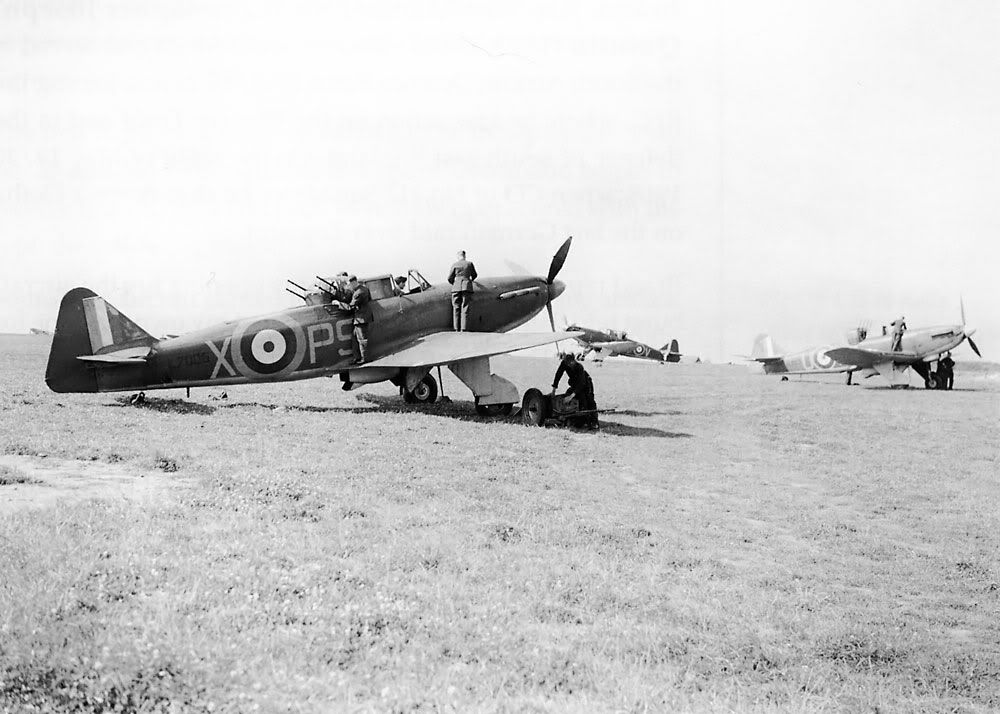 Defiants of No 264 Squadron at Kirton in Lindsey.  Sqn Ldr Philip Hunter (extreme left) of No 264 Squadron holds a briefing. He and his gunner, Fred King had achieved much success during the Battle of France. Hunter was awarded the DSO and King received the DFM and was commissioned from LAC. They failed to return on August 24th, having been last seen chasing Ju 88s following an attack on Manston.
Last edited by RedToo; 04/30/10 07:32 PM.
My 'Waiting for Clod' thread: http://tinyurl.com/bqxc9eeAlways take sides. Neutrality helps the oppressor, never the victim. Silence encourages the tormentor, never the tormented.Elie Wiesel. Romanian born Jewish writer, professor, political activist, Nobel Laureate, Holocaust survivor. 1928 - 2016. Indeed the safest road to Hell is the gradual one - the gentle slope, soft underfoot, without sudden turnings, without milestones, without signposts. C.S. Lewis, 1898 - 1963.
|
|
#3008313 - 05/07/10 09:05 PM
 Re: While we're waiting for BoB SoW: WWII BBC RAF Broadcasts
[Re: RedToo]
Re: While we're waiting for BoB SoW: WWII BBC RAF Broadcasts
[Re: RedToo]
|
Joined: Nov 2005
Posts: 3,070
RedToo

Senior Member
|

Senior Member

Joined: Nov 2005
Posts: 3,070
Bolton UK
|
Part 60. December, 1940 TORPEDOING A GERMAN TANKER TOLD BY A WING COMMANDER Aircraft of the Coastal Command of the R.A.F. have had considerable success lately in torpedoing enemy shipping from the air. The commander of a squadron which has been engaged in these attacks, tells you how they are carried out. THE squadron of Coastal Command which I command has lately had the job of doing from the air what the U-boats attempt from under the sea�that is, the job of torpedoing enemy shipping. The U-boats which manage to slip past the Navy can find British shipping all over the oceans�we ourselves often fly over huge British convoys during our patrols. But the German ships can only creep along their own coastline, or that of countries which they have occupied, slipping along close inshore under cover of their land batteries and fighter aerodromes, escorted by "flak-ships". So that's where we have to go to hunt the German ships. If we run across enemy aircraft on the way over, we fight them. We also do reconnaissance, take photographs, and bring back information for the weather people. But our main targets are German supply ships. They are our big game. And when we find them, we attack them with tor�pedoes, which are slung from the aircraft and launched from the air. You can take it from me that the squadron scoreboard isn't too bad so far, and although we've only been operating a short time, many thousand tons of German shipping will never see its own harbour again. The air crews of my squadron, in order to achieve this, fly in all sorts of weather�rain and storm and mist. They cheerfully run the gauntlet of the enemy's coastal defences, flying where the Germans do not always expect to see a British aircraft. So much so, that when the other day one of our aircraft suddenly swooped through the mist on to a German mine-layer, itself heavily armed and surrounded with flak-ships, the captain evidently mistook the aircraft for a German. For he ran up and down his bridge, flashing the signal "U" at our aircraft. "U" is the International Code for "You are running into danger". It might have been more appropriate the other way round. To give you an idea of what this job is like, let me tell you the story of one actual sinking of an enemy ship. It was carried out by a crew of four�the pilot, the navigator, the air gunner and the wireless operator. I would have liked the pilot to give you this talk instead of me. But unhappily that cannot be. The other day, on a similar mission, his aircraft failed to return. He was last seen going into all the shell-fire imaginable to make sure of his aim before releasing his torpedo. So here is the story of the sinking of an oil tanker, which they carried out only the other day. I telephoned Dick, the pilot, that afternoon in his flight office at the aerodrome, to tell him he was off on a roving commission. Then I met the crew of four in the operations room, to tell them what area they were to search, and to give them all the weather information received from other pilots�actually it was wretched weather, with rain, low clouds, and very poor visibility. Dick went off to see the torpedo properly shipped on his Beaufort and within an hour they had taken off. They flew over to the Dutch coast, popped into one or two harbours to see what shipping was about, and then set off along the coast-line, periodically dodging bursts of fire from the German shore batteries and flak ships. They had practically reached the Danish coast, still in this filthy, grey weather, when they suddenly came upon two big German ships escorted by a flak ship. The attack was all over in a minute or so. The pilot headed straight for the larger ship, a 7,600-tonner. He called to his crew that he was about to attack. He and the navigator hastily worked out the ship's course and speed, and the air-gunner was warned to watch out for the run of the torpedo. Flying a few feet above the water, and at very close range, the aircraft released its torpedo. Then the pilot had to turn violently, only just missing the bows of the ship with his wings, and coming close enough for the navigator to read the name painted on her. About five seconds later the gunner shouted: "Whoopee! We've got her." And then: "Gosh, she's up in flames." They circled round, in spite of flak, and saw the ship ablaze�she was an oil tanker. Flames reached eighty feet above her and smoke 400 feet above that. They brought home a photograph of her, which you may have seen printed in the newspapers. And when they got back, they confessed to me that they had turned the return journey into a sing-song inside their aircraft. I never saw four fellows better pleased in my life. Pics of Dornier Do 17s this week. 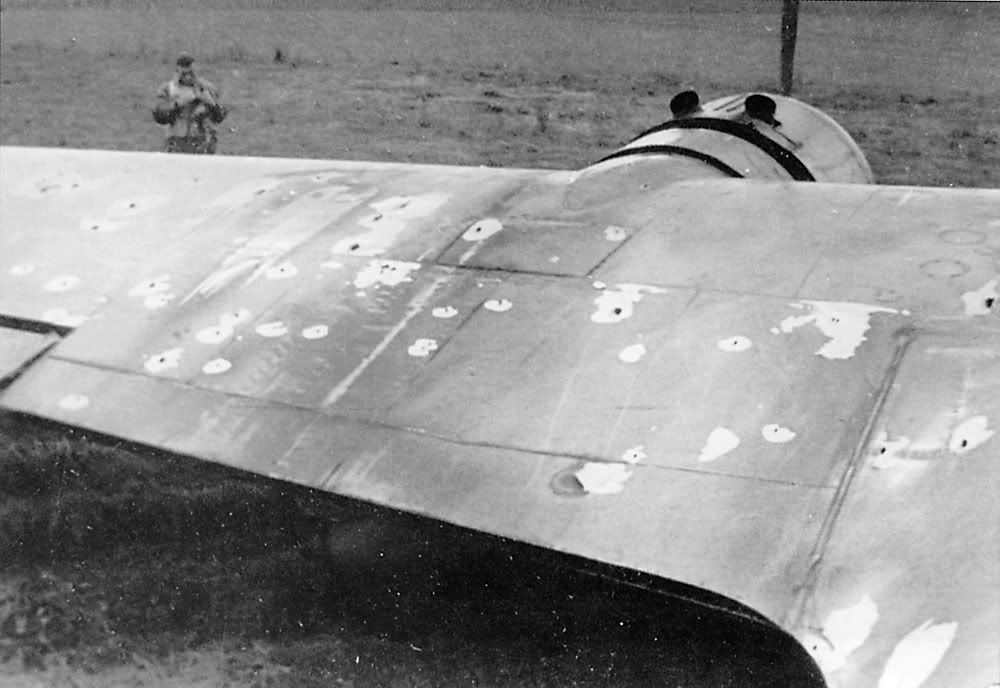 This Do 17 crash landed in France with more than two hundred hits. That number of hits indicates that at least two British fighters fired most of their ammunition into it from short range. On the original print of the wing more than fifty bullet strikes are visible. Indicating the weakness of the .303-in machine guns fitted to British fighters when used against enemy bombers. 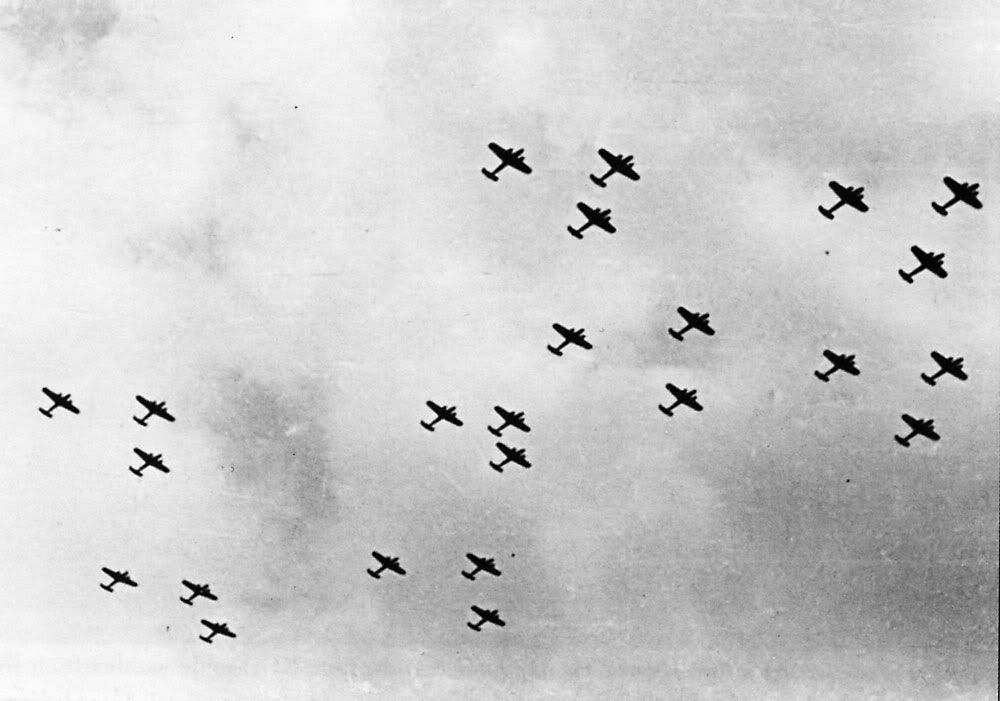 Dornier Do 17s in battle formation. The formation was designed to be easy to fly, while providing crews with the greatest possible concentration of defensive fire-power in the all-important rear sector.
My 'Waiting for Clod' thread: http://tinyurl.com/bqxc9eeAlways take sides. Neutrality helps the oppressor, never the victim. Silence encourages the tormentor, never the tormented.Elie Wiesel. Romanian born Jewish writer, professor, political activist, Nobel Laureate, Holocaust survivor. 1928 - 2016. Indeed the safest road to Hell is the gradual one - the gentle slope, soft underfoot, without sudden turnings, without milestones, without signposts. C.S. Lewis, 1898 - 1963.
|
|
#3011954 - 05/14/10 09:24 PM
 Re: While we're waiting for BoB SoW: WWII BBC RAF Broadcasts
[Re: RedToo]
Re: While we're waiting for BoB SoW: WWII BBC RAF Broadcasts
[Re: RedToo]
|
Joined: Nov 2005
Posts: 3,070
RedToo

Senior Member
|

Senior Member

Joined: Nov 2005
Posts: 3,070
Bolton UK
|
Part 61. December, 1940 WORK OF THE MAINTENANCE CREWS BY A FLIGHT SERGEANT OF FIGHTER COMMAND The British fighter pilot has proved himself supreme in combat. There are several reasons why. Firstly, he is well trained, secondly, he is flying the best fighters in the world and thirdly, his aircraft is always kept in tip-top condition. To see that his Spitfire or Hurricane is fighting-fit every day and often many times a day, is the work of the maintenance staff. The author of the following account is a flight sergeant in charge of the maintenance crews of a Hurricane flight. The squadron has destroyed 100 Nazi raiders. Fighter Command's first V.C., Flight-Lieutenant Nicolson, was serving in this squadron when he won his decoration. You can take it from me that the maintenance crews are "flat out". Each aircraft has its own crew. As a result everybody is very proud of the fighter in his charge. And a healthy rivalry develops, too. They are like the boys in racing stables who groom their own particular horse, call it pet names, slap it affectionately and kiss it when it wins a race. When they hand it over to the jockey on the big day they believe that their horse is the best that money and care can produce. The maintenance crews on our Hurricanes are like that. I've seen them in the morning, taking the covers off the aircraft, slap it under the belly and say some�thing like: "Come on, you beauty, plenty of Huns to-day, please!" Once a pilot came back from a battle after shooting down a Junkers 88 and two Messerschmitts. The crew that serviced that Hurricane did a war dance and went about swanking to the other crews. They regarded the three at one crack as THEIR, work. Then I've heard them comparing notes like: "How many bullet-holes did yours get back with to-day?" And the reply: "Only one." And then the first crew say triumphantly: "One bullet? That's nothing! We had seven in ours, and they were all repaired in no time!" But that is where the rivalry ends�with good-natured high spirits. It begins with real, hard work, but competitive work, mind you. There is keen competition when the aircraft come back to re-arm and re-fuel. One day, when the squadron landed almost at the same time�I mean in quick succession�it took the maintenance crews only eight and a half minutes to re-arm and refuel the lot. Eight and a half minutes from the moment the first machine landed to the time the last machine was ready for the air again, each aircraft having been filled up with petrol and ammunition for another battle. We work long hours, but we don't mind. Our day starts at dawn. The first task is to take the sleeves off the main planes and the canvas covers off the cockpit hoods. Then the pickets which have tied the aircraft down all night are taken up. The fitter gets into the cockpit and the rigger stands by the starting-motor. The engine is started up and run until warm. Then, should there be an alarm, there will be no trouble about starting the aircraft or getting it off the ground quickly. Suppose there is an alarm. The message comes through by telephone and immediately I dash out and shout the signal for every crew to go to their own particular aircraft and start up. At the same time the pilots come from their crew-room and scramble into their aircraft. Sometimes the pilot arrives at the same time as the crew, but as often as not the engine is started when he races up. If it takes more than two and a half minutes from the warning to the time all the aircraft are in the air�well, there is usually an inquest at which I am the coroner. If there has been any delay I want to know why, because every second is precious and might mean the difference between ten Huns or no Huns at all. Well, eventually, the fighters come back. Perhaps they have been in action. As soon as the first one lands it taxis towards the waiting ground crew. A tanker goes alongside to fill up the petrol tanks. At the same time the armourers re-arm the eight Browning guns. The rigger changes the oxygen bottles and fits the starting-motor to the aircraft so that it is ready for the next take-off. Then the rigger takes some strips of fabric which he has brought with him from the crew-room and places them over the gun holes. It helps to keep the guns clean and also helps to keep the aircraft 100 per cent efficient in the air until the guns are fired. Meanwhile, another member of the crew searches the aircraft for bullet holes and the electrician goes over the wiring and the wireless mechanic tests the radio set. Every little part of the air�craft is O.K. before the machine is pronounced serviceable again. All this process should take no more than five minutes, but we allow seven minutes for the whole job. As I said a moment ago, we once serviced a squadron which came back more or less together in eight and a half minutes. If a Hurricane comes down with a few bullet holes, it is my job to see if the injuries are superficial or not. If there are holes through the fabric, we quickly patch them up. If there is a bullet through the main spar, then it is a case of a new wing. Should a machine be found by me to be unserviceable, a spare aircraft is brought for the use of the pilot until his own machine is ready. So the day goes on, this routine happening perhaps two, three, or four times a day. Finally, at nightfall, we make the daily inspection. The armourers clean the guns, the fitter checks the engine over, the rigger checks round the fuselage and cleans it, and the wireless man checks the radio set. The instruments man checks the instruments. When everything is O.K. and the neces�sary papers signed, the machine can be put to bed. The sleeves are put on the wings, the cover is put over the cockpit, the pickets are pegged into the ground and the machine left, heading into the wind, until dawn. It sometimes happens that an aircraft needs, perhaps a new undercarriage. That means working far into the night until the aircraft is ready to fly again. I remember working with other members of the crew fitting a new undercarriage to a Hurricane which had been damaged on landing. We started at four o'clock in the afternoon and we didn't finish until four o'clock the next morning. But when that aircraft came back the next day with a few Huns to its bag it made all our labour well worth while. Like the pilots, we eat our food when we can. If the squadron is sent off at, say eleven o'clock in the morning, and we know that they probably won't be back for at least an hour, we go for lunch. But we always leave a spare crew on duty to deal with any aircraft�maybe from another squadron�which might land. The crews take great pride in the aircraft in their charge. They call their Hurricanes by pet names, always starting with the machine's appropriate letter. Thus you get a machine with the letter "F" called Freddie, "Q" Queenie, and so on. They paint mascots on the aircraft, too. "Freddie," for instance, bears a picture of Ferdinand the Bull. Another aircraft has a witch on a broomstick, another has George and the Dragon, and they usually paint a tiny swastika along one panel for every Hun the pilot has got. They keep the aircraft spotlessly clean, too. After each trip it is wiped clean of oil and every other day the Hurricane is washed and scrubbed with soap and water. And they wash behind the ears, too, as though they were washing a small schoolboy! As you may guess, there is not much time for fun and games. Most of the recreation�darts, shove-halfpenny and such like, are played in the camp, but now and then the airmen get a day off to enable them to find relaxation outside. But generally, they are quite happy staying in camp. During the summer-time our hours are from about three-thirty a.m. until ten-thirty p.m., but in winter the hours of daylight are short, giving us a chance to rest. May I say a word about the fighter pilots? I think they are a fine lot�as good as R.A.F. pilots ever were. I've been in the Service since I was a boy in 1923�I'm only thirty-three now. But I've worked for some grand people. Once I was with some members of the Schneider Trophy teams�when they were instructors at a Central Flying School teaching younger men� now fighter pilots, I suppose�to fly. I am Cornish, though my wife now lives with our three children in the village of Ryther near Selby, Yorkshire. My family are boatbuilders in Falmouth and a great-great-grandfather or something like that, of mine, was a Petty-Officer in Nelson's Victory. He helped to conquer one dictator. I hope to do my bit in conquering this dictator. 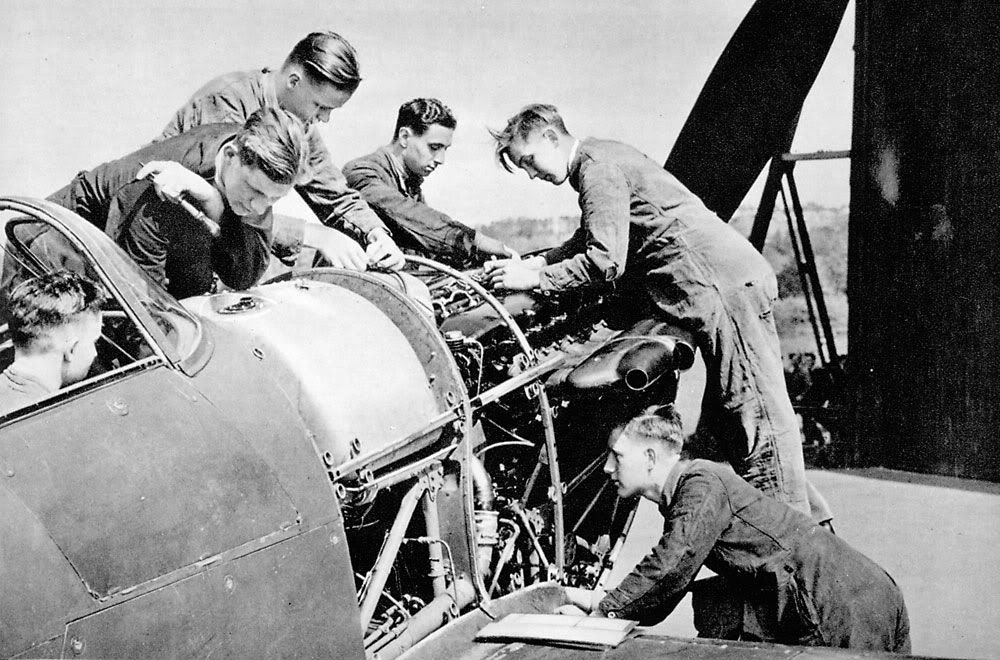 Recruits in training, at work on a fighter engine. 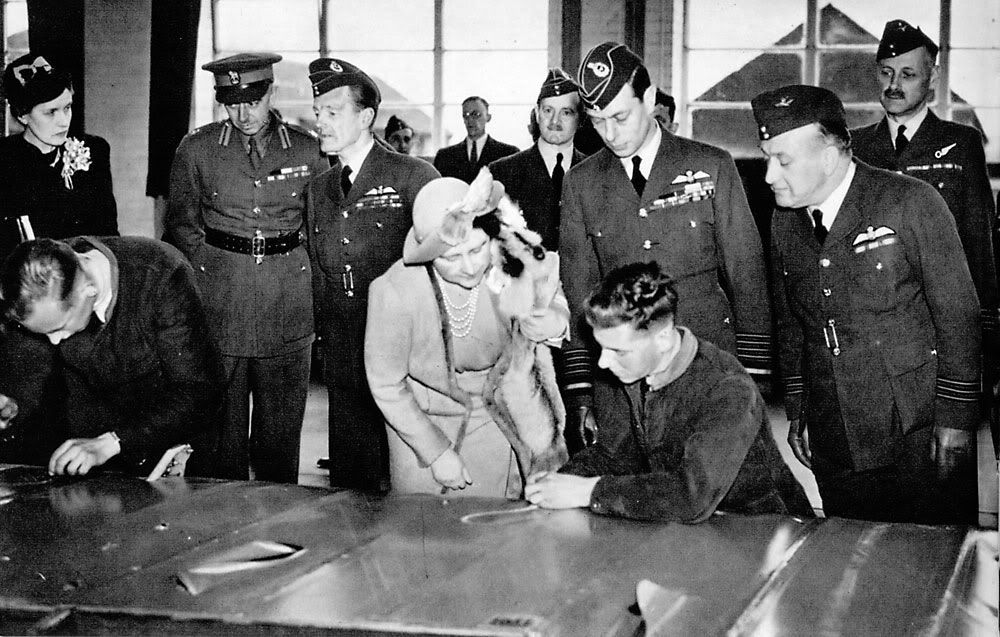 The King and Queen watch a rigger under training. 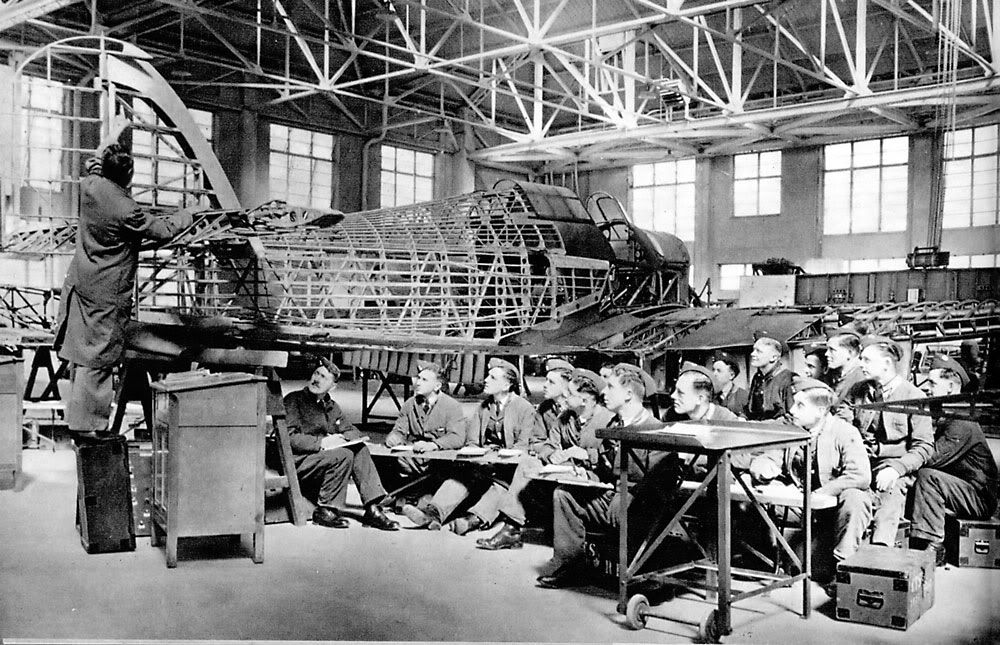 Rigging instructions on a Hurricane.
My 'Waiting for Clod' thread: http://tinyurl.com/bqxc9eeAlways take sides. Neutrality helps the oppressor, never the victim. Silence encourages the tormentor, never the tormented.Elie Wiesel. Romanian born Jewish writer, professor, political activist, Nobel Laureate, Holocaust survivor. 1928 - 2016. Indeed the safest road to Hell is the gradual one - the gentle slope, soft underfoot, without sudden turnings, without milestones, without signposts. C.S. Lewis, 1898 - 1963.
|
|
#3016117 - 05/21/10 08:29 PM
 Re: While we're waiting for BoB SoW: WWII BBC RAF Broadcasts
[Re: RedToo]
Re: While we're waiting for BoB SoW: WWII BBC RAF Broadcasts
[Re: RedToo]
|
Joined: Nov 2005
Posts: 3,070
RedToo

Senior Member
|

Senior Member

Joined: Nov 2005
Posts: 3,070
Bolton UK
|
Part 61. December, 1940 R.A.F. TRAINING BY AN ACTING PILOT OFFICER UNDER INSTRUCTION IT'S several months now since a very Junior Acting Pilot Officer first put on, perhaps a bit self-consciously, a very new R.A.F. uniform, and admired himself in a mirror. I remember how naked he thought the uniform looked without the pilot's wings over the left top pocket, and how he wore his greatcoat on every possible occasion, to cover up that enormous gap of blue cloth where, one day, he hoped wings would grow. Well, to-day, that uniform isn't quite so new, and its wearer perhaps not quite so self-conscious; but he still puts on the great�coat, even on a sunny day, because those wings aren't there yet. In a few weeks maybe�but, at the moment they're�well, shall we call it�semi-sprouting. It's about this half-Hedged state of mine, and how I've got to it, that I'm going to talk now. When I first joined the Service I was plunged into something which I didn't think I was going to like very much. It was called a disciplinary course, and, being a very undisciplined sort of person, I approached it in a "nasty medicine" sort of way�with a "I know this is going to do me good but all the same I don't want to take it" sort of attitude. But I must say�I rather enjoyed it. I was taught how to march instead of slouch; how to be drilled, and to drill, and, very important, how, when, where and whom to salute. After the first few hours of this I realized that there was a higher art on the barrack square. This surprised me, rather like finding out at the age of twelve that rice pudding is really quite palatable. But it was so�as anyone who has ever seen the shambles resulting from giving, say the command "Halt", on the left, instead of on the right foot, will appreciate. By the time I could get a squad on the move, and halt it again without having everyone falling over everyone else's feet, I was posted to an E.F.T.S. I became, in fact, a pupil pilot�or, in other words�a "Nit"�the derivation of this term is obvious� and, in most cases, I fear�justified. It certainly was in mine. An E.F.T.S. is an Elementary Flying Training School, and there I joined in with a lot of other "Ni��"�er�pupil pilots�who had just come from an Initial Training Wing. There they'd already had instruction in several useful things like Morse, and navigation and armament�which put them a bit up on me � because I didn't know a "da" from a "dit" at Morse, or a Browning breech block from a sewing-machine shuttle. The main job of the E.F.T.S. was to teach us to fly. But, in the case of people like me, who thought they could fly a bit already, the instructor had a double job to do�first showing us that we couldn't fly and then teaching us the right, proper official and R.A.F. way. My instructor (and I hope he isn't listening) was a very tough and exceedingly competent Flight-Lieutenant, with that odd mixture of patience and explosiveness which forced his pupils to keep on their best performance all the time they were flying with him. I shan't forget his remark to me on my first bit of dual. He told me to do some turns. I pushed the aeroplane round to the right in my most polished manner. Silence from the front cockpit. So I pushed her round to the left. Still silence. I sat and waited. There came, in my earphones, a long over-patient sigh � and then a gentle voice: "You may call those turns, laddie, but, as far as I'm concerned, they're just changes of direction." The machines we flew at E.F.T.S. were Tiger Moths, open cockpit biplanes of great stability and little speed. We grew to love them�they were such very forgiving aeroplanes. The one I flew mostly�old 84�was very much so�she forgave me many things�crooked loops, bad sideslips, flat turns, bump landings �so much, in fact, that when my flying got a bit better, and 84 had less to put up with, I felt like giving her a lump of sugar, or an extra ration of oil, or something, in return for past favours. Most of my fellow "Nits" went solo after about seven or eight hours dual. The ordinary flying syllabus included slow rolls; stalled turns; rolls off the top of a loop; spinning at least once every two hours, and other gentle means of disturbing one's half-digested lunch�and also we had to do forced landing practices�cross-country flights, and one or two other indispensable exercises. In our course only three pupils failed to make the grade, and this I might say, involved no shame on the people concerned at all. The R.A.F. is purely voluntary, and if pupils decide they don't like flying�or that they aren't good enough�then they're at full liberty to say so, and to turn to something else. One of our instructors put it rather well when talking to a pupil who'd just been suspended. This instructor�incidentally in civil life he was a well-known private owner and an M.P.�said: "There's nothing wrong in not being able to fly. What would seem wrong would be if everyone could." Our ground work was, at least for me, pretty hard, especially the Morse. I managed to learn the code and get up to about six or seven words a minute, sending and receiving, on the buzzer. But, receiving signals on the Aldis lamp, foxed me completely, and, in the examination, I'm sorry to say, I failed on the lamp �the only one on the course to do so. I'm only just managing to cope with it now after another spell of work at my present place, but I fear I shall never grow to love it. We had quite a stiff examination on our ground subjects, including navigation, airmanship, rigging, engines and armament. I got through all right, I think, but I'm still waiting for a note from the examiners to tell me that the proper answer to "What would you do if your aircraft caught fire in the air?" is not "Dial 'o'." And a last word about the instructors themselves. Someone recently published a bit of verse which summed up their lives. He wrote: "What did you do in the war, daddy? How did you help us to win? Circuits and bumps and turns, laddie, And how to get out of a spin." And very true it is. These men�experienced pilots all of them�are doing one of the R.A.F.'s greatest and most unpublicised jobs. Hours of circuits and bumps, correcting the same old faults, getting "Nits" off solo�and then seeing them go away�having their places taken by another bunch, who're going to do the same silly things in the same silly way all over again. Yet, on the whole, most of them say it isn't too bad, and that they become first-rate psychologists, which probably they do. But the real joy of an instructor's life is his collection of stories of the things "Nits" have done. There is the instructor who, to give a titled and illustrious but rather nervous pupil some more confidence in landings, held his hands above his head as the plane was coming in, so that the pupil could see that he alone was doing the landing. The plane came down, bounced, came down, bounced again, and finally jolted to rest. The instructor looked angrily round, and there sat the pupil, hands held firmly above his head. "Well," he said, "you told me last time round to watch how you did things and then to do them your way, so I did." I had collected a nice lot of stories which I wanted to put in this broadcast, but there's no time, so I'll end the E.F.T.S. chapter of my R.A.F. experience with another quotation from my instructor, which sums up life, from his point of view, for those first flying-training weeks of ours. "Up round�down�bump. I've got her�you've got her� I've got her�(sigh)�I've got her." It's been a week or so now since I left E.F.T.S. for a more advanced Flying Training School�where I'm now busy flying twin-engined machines, and preparing for another and stiffer examination. I'll try to let you know how I make out�and I hope it'll be all right�because it's the "wings" exam., and well, I am getting rather tired of wearing my greatcoat. 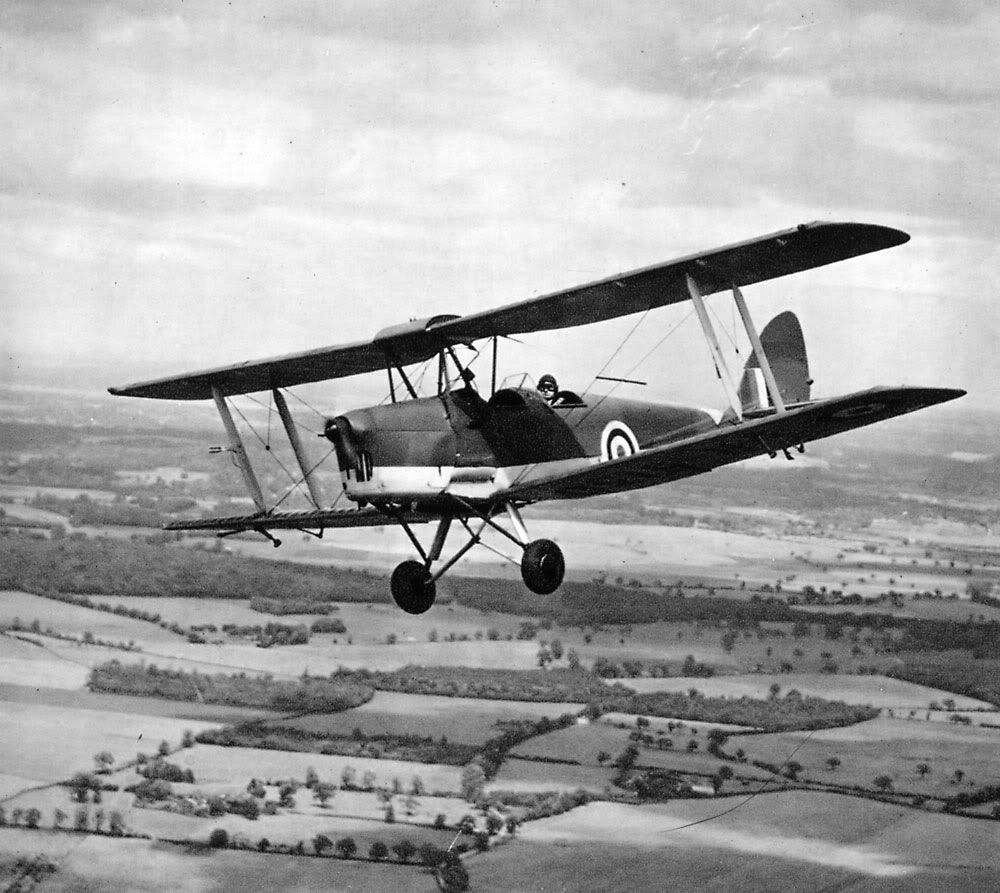 De Havilland Tiger Moth, a valuable training aircraft. 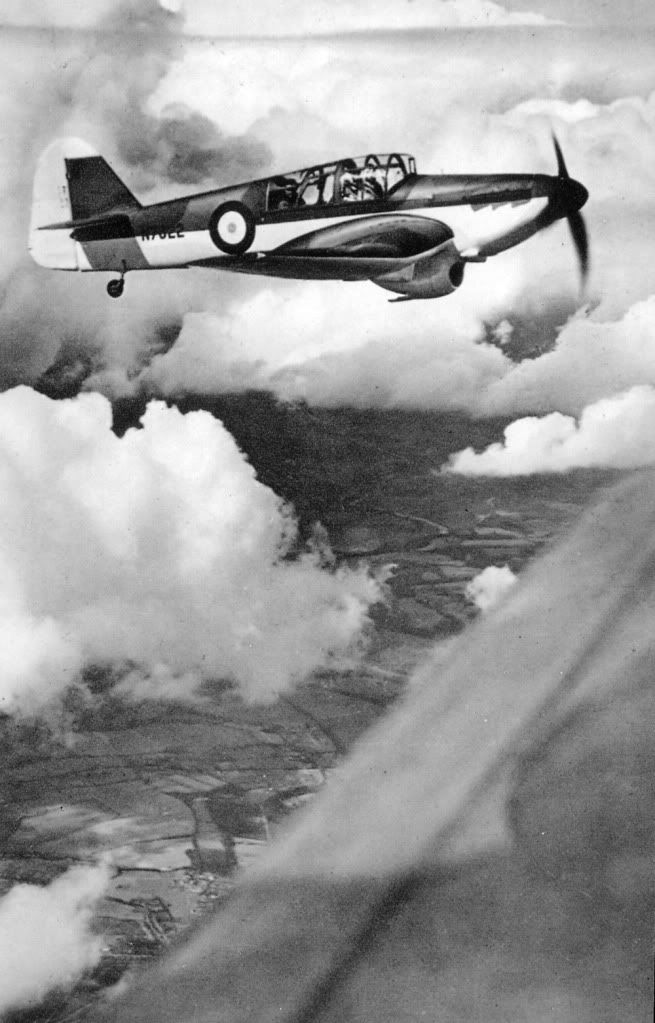 Miles Master, a miniature fighter with a 530 h.p. Rolls-Royce engine capable of 264 m.p.h., used for training fighter pilots.  The Harvard, an American aircraft used extensively for the advanced training of pilots.
My 'Waiting for Clod' thread: http://tinyurl.com/bqxc9eeAlways take sides. Neutrality helps the oppressor, never the victim. Silence encourages the tormentor, never the tormented.Elie Wiesel. Romanian born Jewish writer, professor, political activist, Nobel Laureate, Holocaust survivor. 1928 - 2016. Indeed the safest road to Hell is the gradual one - the gentle slope, soft underfoot, without sudden turnings, without milestones, without signposts. C.S. Lewis, 1898 - 1963.
|
|
#3020715 - 05/28/10 07:58 PM
 Re: While we're waiting for BoB SoW: WWII BBC RAF Broadcasts
[Re: RedToo]
Re: While we're waiting for BoB SoW: WWII BBC RAF Broadcasts
[Re: RedToo]
|
Joined: Nov 2005
Posts: 3,070
RedToo

Senior Member
|

Senior Member

Joined: Nov 2005
Posts: 3,070
Bolton UK
|
Part 63. December, 1940 ATTACK ON MANNHEIM BY A SQUADRON LEADER The speaker, a Squadron Leader in one of our heavy Bomber squadrons, describes a recent raid on Mannheim which has lately received a great deal of attention from the R.A.F. He holds the D.F.C., awarded for his work on the night of the attack on Munich. THE operation the other night against Mannheim was on a pretty big scale; aircraft from a number of squadrons were operating. The general idea was to send in the early ones with incendiaries so as to light up the target, then for the main force to come along with heavy stuff. The operations of the main force incidentally were spread over a period of six or seven hours. The station commander had a word with the captains and crews before we left. He said he was expecting some very good results. He also mentioned that, as there would be a lot of aircraft con�centrating on Mannheim, he wanted us to go in, bomb and come out again as quickly as possible. We left at regular intervals. It was important to keep strictly to the scheduled take-off times because of working in with the other stations, so as to make the bombing a more or less non-stop affair once it started. Just when we were due to get away it started raining cats and dogs. One could just see a few blurs of light indicating the flare-path and that was all�rather like driving a car in heavy rain without a windscreen wiper, only more so, if I may put it that way. However, we all got off all right. The cloud base was at a thousand feet, and we had to climb up to get through it. We were climbing rather slowly, too, because we were carrying a heavy load. Once we got above the clouds, we were in bright moonlight and the navigator got his sextant out and started taking Astro sights to check up on our position. Normally, when you cross the Dutch coast you reckon to get a bit of flak thrown up at you but this time, being still above cloud, we got nothing at all. We flew on, keeping straight and level. Then, fifty miles inside the Dutch coast, the cloud cleared and we saw the ground for the first time since we'd taken off. Altogether, it was a very uneventful trip out. In Germany they'd had a fall of snow which was quite a help to navigation. When you have a light fall, as this was, the important things� woods and rivers, lakes and towns and villages�all stand out much clearer, and so, with the moon very bright, we pin-pointed ourselves quite easily as we went along. We were some distance from Mannheim when the front-gunner reported heavy flak ahead. We were then about ten minutes away heading straight for it and we knew it must be Mannheim. The stuff was coming up in bursts and then dying away, then breaking up again, spasmodically. I told the navigator to prepare for bombing and he came up into the bomb aimer's position in the nose of the aircraft with his map. Having done that, he had to check up on the bomb switches, select his bombs, and we determined the length of the stick. One can drop a widely spaced stick or a close one. This time I had decided on a very close one. As we approached, I could see fires already well under way, and it was obvious that the blitz was in full swing. We picked up the Rhine, followed the river up and then started to take avoiding action because there was quite a lot of flak, mostly light stuff, coming up. It's all tracer, this light stuff and you can see strings of it coming up. The flak seemed to be pretty continuous by now. When it gets like that, one just goes through it, doing evasive stuff. I don't think flak deters any of the fellows from carrying out the job. One sometimes sees German reports of the barrage turning our aircraft back. In my opinion, that's just nonsense. As we got a bit closer, the navigator called out "Ready", and I levelled out and opened the bomb doors. You only do that at the last minute because when they are open it makes the aircraft drag a bit, so you open the throttles a little to compensate the slight loss of speed. You tell the navigator "Bomb doors open, master-switch on," and he repeats that back to you. He will probably make a few corrections to course�"left, left, right, right, steady," and so on�and when he's bombed he calls out "Bombs off". As a matter of fact you can feel the bombs go. You get a slight lift in the aircraft and it immediately becomes much more lively. I must say, I always find it a bit of a relief directly they've gone and one knows that one's done the job one was sent out to do. Well, on this occasion everything went normally and as soon as the bomb aimer said "O.K., sir, bombs burst," I put the aircraft into a steep turn to let the crew have a look. There were three groups of huge red fires burning down below and spirals of heavy black smoke rising above the town. The fires were increasing in intensity all the time. Then, we set course for home, we could see other people bombing as we came away. I told my rear gunner, as I always do, to note the time when he could no longer see the fires, and we were about sixty miles away when he called out and said he'd lost them. Nothing very much happened on the way back. Coming down through the clouds over the North Sea we started to get iced up a bit. Pieces of ice were threshing off the air-screw and coming through the fabric of the fuselage, but we got back without any real trouble. Everybody had seen much the same sort of thing as we had�fires and still more fires �and the general feeling in the squadron was that the show had been a great success. A couple of Spitfire pics I�ve just stumbled across: 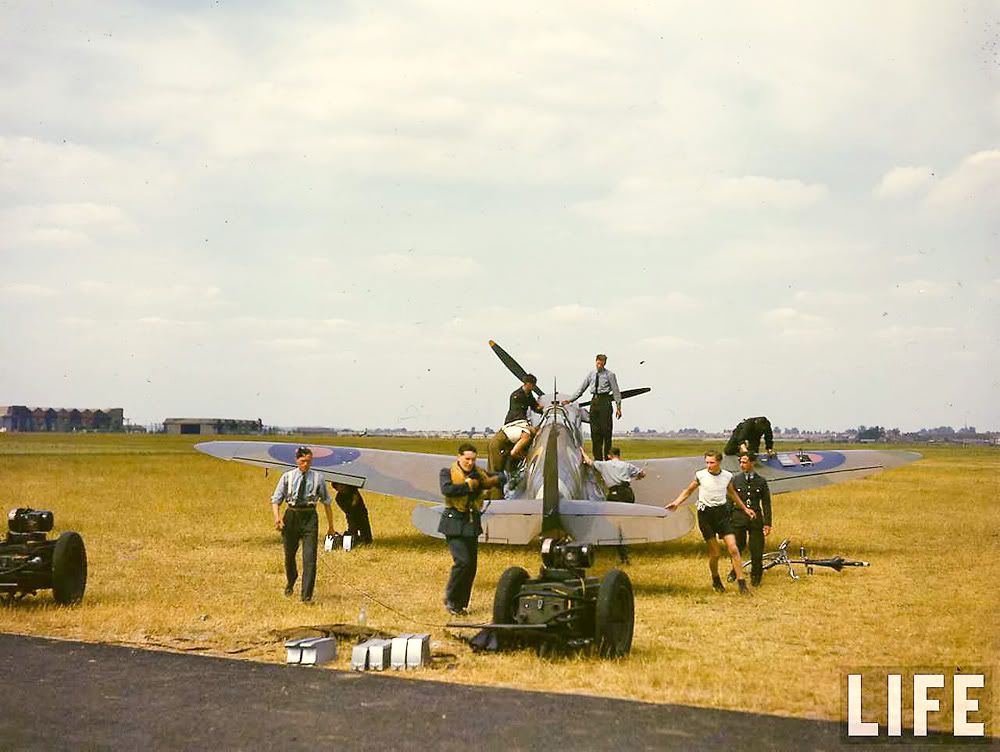 Re-arming. 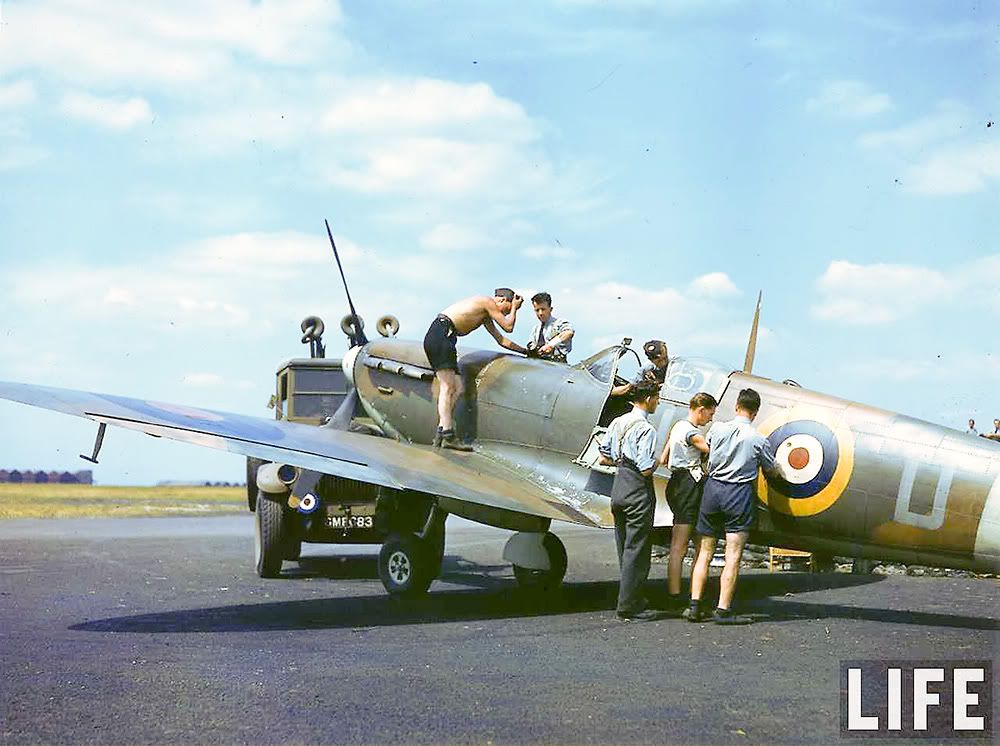 Re-fuelling.
My 'Waiting for Clod' thread: http://tinyurl.com/bqxc9eeAlways take sides. Neutrality helps the oppressor, never the victim. Silence encourages the tormentor, never the tormented.Elie Wiesel. Romanian born Jewish writer, professor, political activist, Nobel Laureate, Holocaust survivor. 1928 - 2016. Indeed the safest road to Hell is the gradual one - the gentle slope, soft underfoot, without sudden turnings, without milestones, without signposts. C.S. Lewis, 1898 - 1963.
|
|
#3025057 - 06/04/10 07:11 PM
 Re: While we're waiting for BoB SoW: WWII BBC RAF Broadcasts
[Re: RedToo]
Re: While we're waiting for BoB SoW: WWII BBC RAF Broadcasts
[Re: RedToo]
|
Joined: Nov 2005
Posts: 3,070
RedToo

Senior Member
|

Senior Member

Joined: Nov 2005
Posts: 3,070
Bolton UK
|
Part 64. December, 1940 RAID ON TARGET NEAR VENICE BY A FLIGHT LIEUTENANT The speaker is a twenty-three-year-old Flight Lieutenant in a heavy bomber squadron. He describes a recent flight from England to Italy to bomb a military target at Porto Marghera on the Italian mainland near Venice. THAT was the longest trip I had ever done. One knew it was going to be a pretty tiring business�ten hours or so there and back�on the other hand one was very pleased to be given the opportunity of doing something that was really new. Once before the squadron had been briefed for Italy and we'd been disappointed by having the operation cancelled because of bad weather. This time everything looked absolutely perfect from the word 'go'. It was just after six o'clock in the evening when we got off. The navigator pin-pointed himself on the coast, then we made a slight alteration of course and got our next pin-point on the other side, crossing the North Sea in comparative darkness because the moon hadn't risen yet. I decided we were a little too low to cross the coast safely in case we hit a heavily-defended area, so we turned left along it to gain an extra fifteen hundred feet. While we were gaining height in that way a fighter passed very close to our tail, but he evidently didn't see us. At any rate, he didn't attack. The rear-gunner, of course, wanted to have a crack at him�all air gunners always do�but it had come and gone too quickly for him to get his sights on it. We were taking as direct a route as possible to avoid passing over neutral territory. Seventy miles inland and ground became snow-covered. It was a fairly cold night�minus twenty degrees at twelve thousand and, later, at fifteen thousand, minus twenty-five. We were climbing gradually all the time, until we'd reached a good height for crossing enemy territory. And we continued at that height. It was then just after nine o'clock. Half an hour before reaching the Alps we started to climb again and went up to fifteen thousand. If it hadn't been such a good night from a weather point of view I should certainly have gone higher than that to get across. As it was, the winds were slight and there was no cloud, so there was no danger either of unpleasant bumps or icing conditions. We came to the foothills of the Alps after about three and three-quarter hours' flying. It was a nice clear night with every�thing in our favour. A lot of people burble about the beauties of the scene. Well, personally I must say, I was rather more impressed by the fact that if anything went wrong there was little chance of coming down safely, except perhaps by parachute. It was difficult to tell one peak from another. We were up at twelve or thirteen thousand feet. I suppose it must have taken about an hour from the com�mencement of the foothills on one side until we were clear of the foothills on the other side. The moon was still not up and, having crossed the Alps, it wasn't at all easy to see any detail on the ground now that there was no snow to help us. In fact, it was so dark that we turned along the river, thinking for a moment that it was the coast. Eventually we came out some miles from Venice. The navigator recognized Venice from the form of its waterways and then we turned along the coast. Mean-while the bomb-aimer was adjusting the various settings on the bomb-sight, such as, height, wind and air speed, and trail angle. There was still no moon but a coast is always easy enough to follow on a clear night, however dark it is. We could see the outline of Venice very clearly defined as well as the famous lido and the bridge connecting Venice with the mainland. The target was a petroleum works which lay on the mainland just west of the end of a bridge, near the docks. Its position was quite obvious as we knew exactly where it was and we could have bombed it without a flare, but I decided it was quite worthwhile dropping a flare and having a look at the place before we attacked it. We ran up along the bridge, dropped the flare, did one circuit round it and then went out again and came in to make the bomb�ing run from the same direction. The navigator watched the bomb burst on the target area and we did another circuit and saw parts of the plant going up in flames as the incendiaries dropped. There was a train crossing the bridge at the time and the explosion must have been a bit of a shock to the unsuspecting Italian passengers. Altogether, we were about twenty minutes over the target area. Then we turned for home, and as we approached the foothills of the Alps on the way back, the navigator who was in the astro hatch, said it looked as if the moon was sitting on top of a peak. We climbed to fifteen thousand again to get over the high part. The Alps looked a little more friendly now. That may have been due to the moon, but probably the fact that we were on the homeward journey had something to do with it too. Frankly, we were none of us sorry to see the last of the mountains. Just this side of the Alps we ran over cloud which blanketed out the ground. Then, having got clear of that, there was a lot of ground haze which made visibility very poor and again we were flying on dead reckoning navigation. On the English side of the Channel there were ten-tenths cloud at four thousand feet and we were flying above it, in fact, we were not able to see the ground at all. I was pleasantly surprised when we got the "Over" signal�that's to say a signal from the ground, "You are over the aerodrome." However, my aircraft had behaved magnificently over the whole journey, and had taken us there and back in the very good time of nine and a half hours. 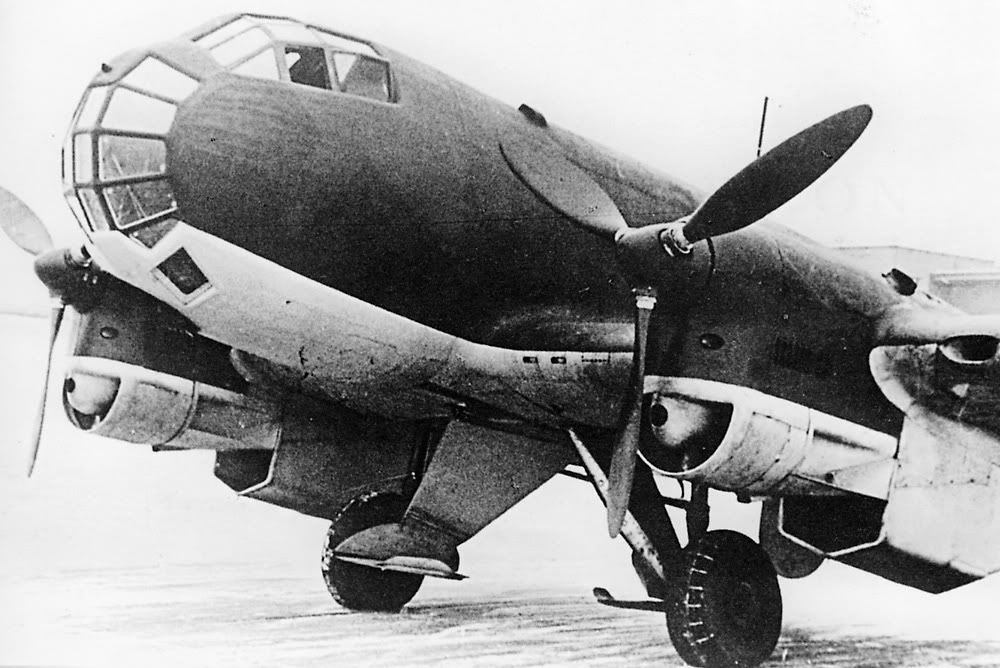 Junkers Ju 86P high-altitude reconnaissance aircraft. This advanced aircraft featured a pressurised cabin and was powered by two highly supercharged diesel engines, enabling it to operate at altitudes above 37,000 feet, where it was immune from fighter interception during the early war years. 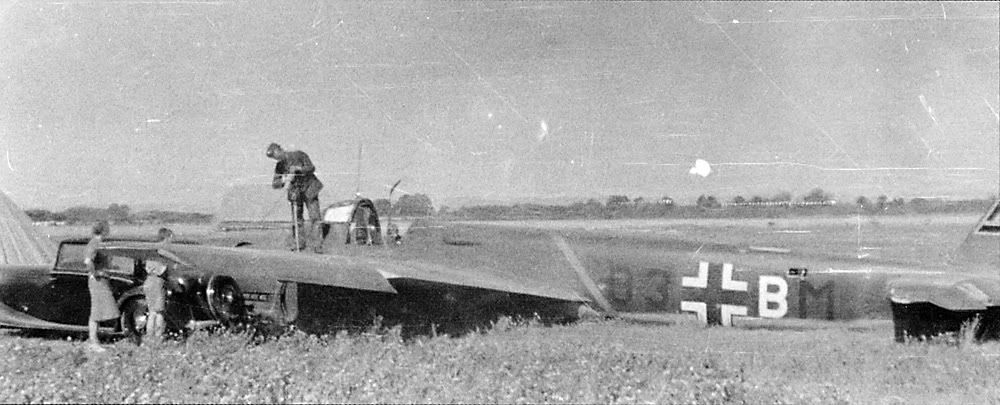 Spoils of war. Royal Air Force personnel pumping petrol from a Ju 88 of KG 54 that crash-landed near Tangmere into a private car belonging to one of them. Such misuse of captured enemy material was illegal, but those in authority turned a blind eye to it.
Last edited by RedToo; 06/04/10 07:12 PM.
My 'Waiting for Clod' thread: http://tinyurl.com/bqxc9eeAlways take sides. Neutrality helps the oppressor, never the victim. Silence encourages the tormentor, never the tormented.Elie Wiesel. Romanian born Jewish writer, professor, political activist, Nobel Laureate, Holocaust survivor. 1928 - 2016. Indeed the safest road to Hell is the gradual one - the gentle slope, soft underfoot, without sudden turnings, without milestones, without signposts. C.S. Lewis, 1898 - 1963.
|
|
#3029520 - 06/11/10 09:54 PM
 Re: While we're waiting for BoB SoW: WWII BBC RAF Broadcasts
[Re: RedToo]
Re: While we're waiting for BoB SoW: WWII BBC RAF Broadcasts
[Re: RedToo]
|
Joined: Nov 2005
Posts: 3,070
RedToo

Senior Member
|

Senior Member

Joined: Nov 2005
Posts: 3,070
Bolton UK
|
Part 65. STORY BY A CANADIAN SPITFIRE SQUADRON LEADER The author of the following account is a young fighter pilot of whom Canada may well be proud. To-day the leader of an R.A.F. Spitfire squadron, he had flying in his blood ever since he went to school in Winni�peg, Manitoba. He made his first flight when he was fourteen, and he learned to fly an aeroplane two years later. At seventeen, he was the youngest licensed flyer in the Dominion and when he got his commercial licence, two years later, he was the youngest commercial pilot. So he sailed for England in 1935 to join the R.A.F., and within a fortnight of his landing in Liverpool he was in the Royal Air Force. Before the war started he had been awarded the Air Force Cross for a particularly dangerous job of flying. Just recently he won the Distinguished Flying Cross, for gallantry in action as the leader of a Spitfire fighter squadron. WELL, I've been lucky enough to see quite a lot of this war so far, and believe me, I hope I'm going to see a lot more of it before it's through. I want to see, for instance, another afternoon like that of September 27th, when the R.A.F. slapped down more than one hundred of Goering's Luftwaffe. At the time I was a flight commander in the now famous Polish squadron, flying Hurricanes, and with several other squadrons we went up to meet the Germans. A terrific anti-aircraft barrage was being put up round London, and from where we were we could see the capital gradually become encircled by a ring of smoke puffs from the bursting shells. Then we saw the hordes of German bombers and escorting fighters coming in over Kent. As R.A.F. fighters got stuck into them, you could see them falling away, plunging down with smoke pouring from them. It almost seemed that there was an invisible barrier over a certain part of Kent and that as soon as the bombers reached it large numbers of them suddenly began pouring out smoke and going down. It was an amazing sight and if I hadn't seen it all happen, I would never have believed it. All this was happening in the few minutes before we arrived. Our squadron, by the way, was accompanied at the time by a Canadian Fighter Squadron, so I felt quite at home as we went into battle. I got behind one bomber and went straight in at him. When I was about seventy-five yards from his tail, his rear gunner suddenly realized that I was there and opened fire. I fixed him with my first burst. Then I pressed the gun button again and kept my thumb on it for several seconds, and shortly afterwards he began to go down in flames. I watched him and saw him go into the sea with an almighty splash. Another German bomber which crossed my sights got a quick burst from another pilot and as he went gliding down I saw a red glow appear under his belly, and as the glow got bigger, so his dive got steeper. He exploded before he hit the water, and it began raining little pieces of aeroplane from the spot where he had blown up. There was a lot of milling around in the sky that afternoon, and when the Canadian squadron and ourselves got back we found that we had collected more than a dozen Huns between us. The day's score, as I said, was over the hundred mark. I got two bullets in my Hurricane that day, and they are the first bullet holes I have had in my aeroplane since the war started and I hope the last. I want to tell you right now that it was a grand experience fighting with the Poles. When the squadron was first formed at the end of July the nucleus consisted of an English Squadron Leader and two flight commanders, of whom I was one. The Poles who came along had plenty of fighting experience. They had fought in Poland, and later in France, and when we got together in the early days of August we were all flat out to have a crack at the Huns. By the end of the month we had taken our place in the front line. The first morning in the front line we were sent to escort a formation of our bombers; we ran into a raid and we got a Dornier 17 first crack. The next day we got six Messerschmitt 109 fighters, and from then on we slapped 'em down as they'd never been slapped before. In their first four weeks that Polish squadron shot down more than one hundred enemy aircraft, and in five weeks we had shot down more than one hundred and twenty. You can take it from me that those Poles were magnificent fighters�and they still are. They introduced their own technique into air fighting. They sailed right into the enemy, holding their fire until the very last moment. That was how they saved ammu�nition and how they got so many enemies down on each sortie. When I started talking, all sorts of incidents come crowding into my mind about this war. I was in France doing a special job in a Spitfire from May until June 16th. Just before the French collapse I remember flying over one part of the country in which there was not a single living thing. Not a head of cattle, not a dog, and certainly not a human being. And then I came upon the refugees and saw, for mile after mile, roads packed tight with people, fleeing before the Germans. At one stretch I should say there were forty miles of road packed solid with refugees. There were tragic sights to be seen on the ground, too. In every hotel the people were lying about all over the place, just snatching a little sleep before moving on. I remember, particu�larly one old woman, with all her worldly belongings in an ancient perambulator. Yet she had a cage hanging by the side of the pram, and in the cage was her cat. They were pitiful sights, but the French were very brave. I got on very well with them, largely, I think, because I am a Canadian. Before, and even after the collapse, you only had to say you were a Canadian and there was nothing that the French would not do to help you. Since I've been back in England I've had my share of excite�ment�and when it's been in the air it's always been most enjoy�able. Some days ago, for example, we saw between sixty and eighty Me. 109s, and though there were only five of us Spitfires at the time, we had a height advantage of some 6,000 feet. We just nipped down on them. The one I got first began to belch black smoke and went streaking down, leaving a tremendous trail of smoke that stayed in the sky for at least ten minutes. Then I had a terrific dog-fight with another Messerschmitt which attacked me immediately afterwards. He could fly, too, could that Hun. He kept swinging up and round into the sun and several times I had to guess where he was as he disappeared with the sun right behind him. I squirted at him several times like that and finally saw him come out of his protecting sunshine with his tail nearly off. The fin and rudder were in tatters. As we rushed towards one another I could plainly see the pilot looking straight at me. We missed each other by feet. As he turned to the left he made a target of himself, so I squirted him for a second. He flicked over on his back and with grey smoke simply pouring out, went straight down towards the Kentish soil. He went into the ground with an awful smack. There was a flash of flame, a cloud of smoke, and when I looked again there was nothing but a gaping hole with a few tiny pieces of scattered wreckage round the edges. I saw some British Tommies run across to the crater he had made and look down. Then they waved up at me and gave me the thumbs up sign. Well, that's the kind of job we're doing and we get quite a kick out of it. Of course, you don't run into Huns every day of the week, but when you do go up to meet him you feel so good that you think you could take on the entire German Air Force single-handed. These Spitfires we're flying may account for some of that feeling�they're certainly good. Altogether now I've done about one hundred and fifty hours' operational flying in this war and I only hope there's going to be a lot more to come. 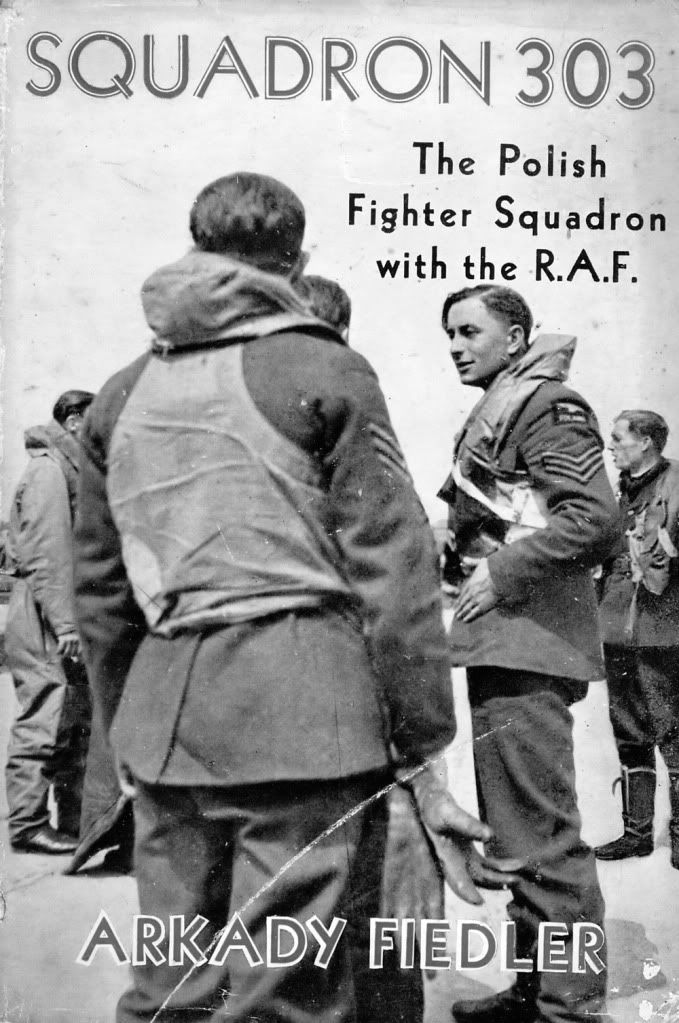 Pilots of 303 Squadron �The Polish Squadron� on the cover of the book about 303 Squadron published in August 1942. The text of the book can be read here: http://www.archive.org/details/squadron303006829mbpThe language in the translation is even more "flowery" than in the original, but the stories and stats are very interesting, especially seeing how this was the highest scoring squadron with the highest scoring aces of the battle on the British side. Thanks to Woke_Up_Dead for the link. 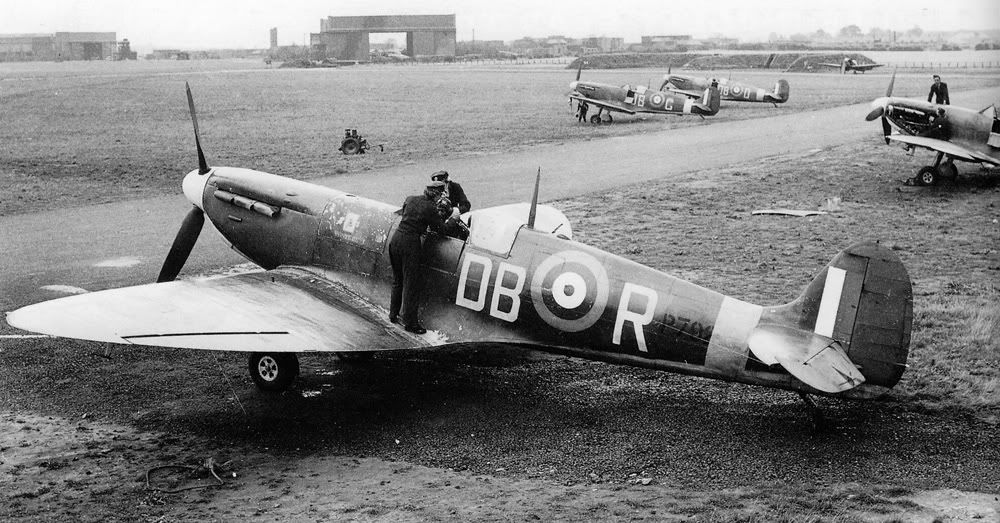 WAAF mechanics helping the pilot strap into a Spitfire Mk II of 411 (Canadian) Squadron, at Digby in Lincolnshire in 1941.
Last edited by RedToo; 07/04/10 10:59 AM.
My 'Waiting for Clod' thread: http://tinyurl.com/bqxc9eeAlways take sides. Neutrality helps the oppressor, never the victim. Silence encourages the tormentor, never the tormented.Elie Wiesel. Romanian born Jewish writer, professor, political activist, Nobel Laureate, Holocaust survivor. 1928 - 2016. Indeed the safest road to Hell is the gradual one - the gentle slope, soft underfoot, without sudden turnings, without milestones, without signposts. C.S. Lewis, 1898 - 1963.
|
|
#3034683 - 06/18/10 08:37 PM
 Re: While we're waiting for BoB SoW: WWII BBC RAF Broadcasts
[Re: RedToo]
Re: While we're waiting for BoB SoW: WWII BBC RAF Broadcasts
[Re: RedToo]
|
Joined: Nov 2005
Posts: 3,070
RedToo

Senior Member
|

Senior Member

Joined: Nov 2005
Posts: 3,070
Bolton UK
|
Part 66. December, 1940 RAID ON LORIENT BY A CZECH PILOT IT IS just a few nights ago that I am making my first mission with the Royal Air Force against the enemy. I was for four years observer in the Czechoslovakian Air Force. I go to France and I am nine months in France in the French war. Then I come to England with a little ship from Bordeaux. It is a little merchant ship. Eight hundred tons. A little Dutch ship. I am in some camps here and then I go to a Czech depot. I do not speak any English when I arrive. I buy an English dictionary and when I have free time, I learn to speak it: but it is not so quickly. Then, since September, I am in the Czech bomber squadron with the R.A.F. I have a course of navigation which is most painstaking and in October I am ready, but I must wait for my pilot. He is not so ready. We are to fly Wellington bombers. It is very good, the Wellington. So, I am waiting to go for some weeks, but my captain is not yet fully instructed. Then, when he is ready and we are to go, he becomes ill. He has influenza and after more waiting I go on this, my first mission, with another crew. Before this happens I have asked already to go with another crew until my pilot is finally prepared, but this is not possible, for all the other crews are complete and it is not good to chop and change crews. But now I can go. We are on this occasion to bomb the submarine base at Lorient. Our pilot is a sergeant and we have altogether three other sergeants and two officers. Before we go we are briefed most exactly by our own Czech wing commander. The wing-commander tells me that I must find exactly this target to bomb. He gives me the position of anti-aircraft guns and the position of submarines in these docks at Lorient. When we are going out the weather is good. It changes very quickly, the English weather: now good and then after two or three hours it is, perhaps, bad. This was good all the time except that when we come back we have some clouds�but that is not yet. When I come to the French coast I am finding myself a little off my course. You see, I am to be here at a certain point, and I am four miles from this but I fix me by the coast and we go on. The aircraft goes very well indeed. Before we have come to Lorient we have seen a big fire: I think about twenty-five miles away. Also big anti-aircraft fire and searchlights�many of searchlights�and much of anti-aircraft fire. When I see all this I say, "That is Lorient where we are to go", but we are already going in this direction so it is not necessary to make an alteration. We go into the anti-aircraft fire and into the searchlights. They fire at us but the explosions are not of our height. The others with me have already made eight or nine missions with our squadron and have been under fire very often, but for me it is the first time. It looks very nice, I think, and illuminates the night very nicely. We are flying into our target from the north. I go a little to east and turn also back to south. Before this, I have prepared my bomb-sight. Then I am looking and giving the directions for my pilot. I have seen the river and on the right side of the river I have seen here a big building which must be the smithery which is shown for me on my map. I have seen the river very good. It looks a little lighter than the ground and it is quite simple to see. Also I can see the docks. There is no cloud at Lorient: only little patches of mist, but we can see through them quite simply. When we get near we see again the fire that we have seen before, but now he was not so great: he is dying. Since I am to make the bomb-aiming I am lying on my stomach in the nose of the aircraft looking down on all this. I have, besides heavy bombs, many incendiaries. When I have the target in my bomb-sight I tell to the pilot "Straight on". He goes straight on and when I have got this target as I want it I press the switch. I can see the bombs go from the aircraft. Just for one moment. No more. The rear gunner says he has seen the explosions from the bombs. Then it is most remarkable what happens. There are between twenty and thirty big explosions and soon they are making altogether one big fire. There is much talking in the aircraft at all this and everybody asks the others to look at what is happen�ing. The front gunner is pleased and cries away that it is the biggest fire he has seen in all the nine missions he has made. All this time, they are firing at us also heavily, but again it is a little down and not of our height and we are not hit. It is very good because this fire had held on so well that when we go back from the target twenty minutes the rear gunner is finding it still possible to see the fire. When we are going back, there is more fire at us for one or two minutes, but still we are not hit and we come home without difficulty. When we are home once again the wing commander is very pleased with what we have done and tells us that this was a very good show. 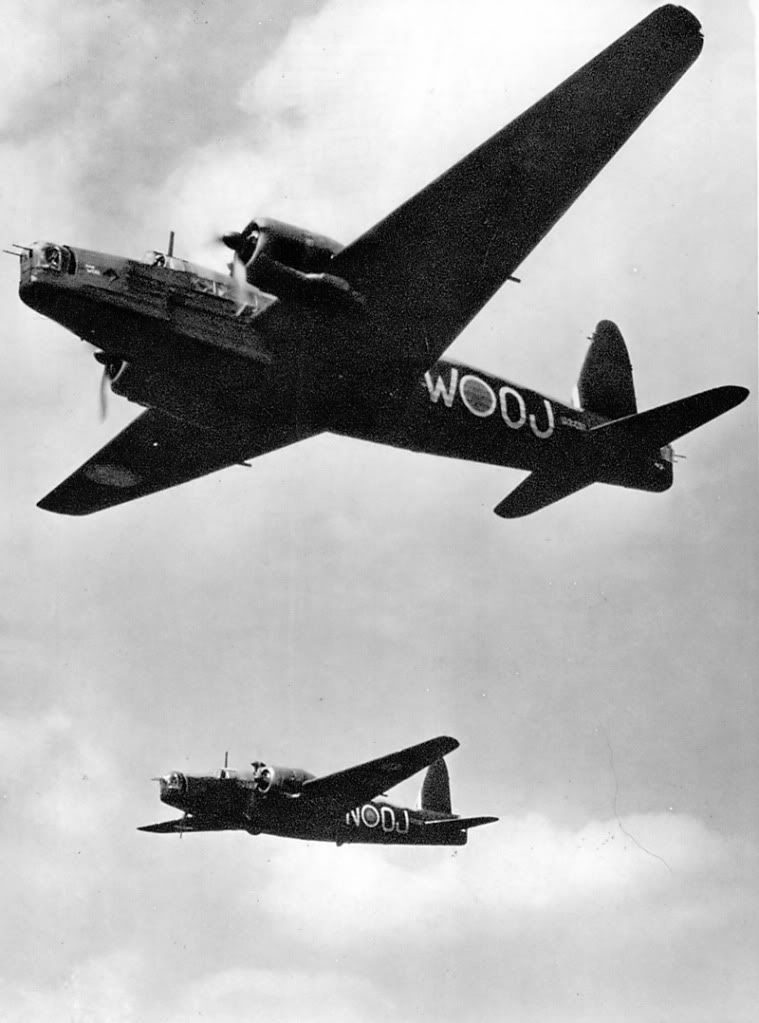 Vickers Wellington Bombers. Two Bristol Pegasus engines developing 2,000 h.p.
My 'Waiting for Clod' thread: http://tinyurl.com/bqxc9eeAlways take sides. Neutrality helps the oppressor, never the victim. Silence encourages the tormentor, never the tormented.Elie Wiesel. Romanian born Jewish writer, professor, political activist, Nobel Laureate, Holocaust survivor. 1928 - 2016. Indeed the safest road to Hell is the gradual one - the gentle slope, soft underfoot, without sudden turnings, without milestones, without signposts. C.S. Lewis, 1898 - 1963.
|
|
#3039731 - 06/25/10 09:13 PM
 Re: While we're waiting for BoB SoW: WWII BBC RAF Broadcasts
[Re: RedToo]
Re: While we're waiting for BoB SoW: WWII BBC RAF Broadcasts
[Re: RedToo]
|
Joined: Nov 2005
Posts: 3,070
RedToo

Senior Member
|

Senior Member

Joined: Nov 2005
Posts: 3,070
Bolton UK
|
Part 67. January, 1941 RAID ON BREMEN BY A SERGEANT PILOT As you already know the RA.F. last week bombed military objectives in Bremen on three successive nights. I was on two of the three raids. I will describe my second one because it�s more vividly in my mind; in fact, I've never seen anything like it before. When we left there were so many fires in Bremen that I gave up counting them. We set off soon after tea-time: actually, I remember it was five-forty-six when we got on to the flarepath. The weather was very bad. We circled the aerodrome to get a bit of height: then almost immediately we had to climb through thick cloud, so that for the first half hour we were flying blind. Ice was forming on the windscreen and it looked as though we were going to have a bit of trouble so I started using my de-icers. But we came out of these bad conditions at seven thousand feet and above that it was beautiful weather�lovely and clear�with a quarter moon and plenty of stars. The only snag was that it was appallingly cold. In the ordinary way, I usually fly the aircraft out and fly it while we are doing the bombing: then when we've got clear of the target area, I hand over to the second pilot as far, say, as the North Sea: then I take over again. But this time it was so cold that we changed over several times both going out and coming back in order to try and get warm by moving about a bit. It'll give you some idea of what it was like, perhaps, when I tell you that once when I had some tea out of the thermos flask to try and warm myself up a little, there was ice at least an eighth of an inch thick round the rim of the cup when I'd finished drinking. But, apart from the cold, conditions were perfect. We got a bit of flak going over the Dutch coast but it wasn't really worth bothering about and I just carried on straight and level. So far as possible, I always try to keep a constant air speed going out and avoid jinking as much as possible�that's to say dodging about to avoid enemy fire�otherwise it only makes things more difficult for the navigator. Having got over this bit of flak quite safely we flew on steadily towards our target and without incident. When we were still about sixty miles away we could see a red glow in the sky, and thirty or forty miles off we could actually see flames rising above Bremen. We went in about five miles south of the target. I cut the engines as much as I could to avoid being picked up by the enemy, and of course, I was jinking now, all right. Then I did a very gentle left-hand circuit and I thought I'd try and count the fires as we were going round. I got up to thirty and then gave up. There must still have been at least another twenty or so in the target area. Some of the fires were very long in shape as though factories or other large long buildings were on fire. In one place there was a tremendous fire three or four hundred yards long. A deep red glow was reflected in the river and the fires were so numerous and so bright that they lit up the whole town, and my navigator was able to make his run up guided by the bridges across the river. As we were circling I saw three sticks of bombs go down. Then, just as we were starting our run up, the flak became rather more heavy ahead of us and I saw another bomber run�ning up, right across our track, but about a thousand feet above us and roughly half a mile ahead. This other plane was held in a large cone of searchlights: there must have been twenty-five or thirty lights on him. I could see his bombs leave the aircraft, and I was able to follow them for about five hundred feet as they fell. I didn't see them burst, though, because I was too intent on our own run up, but out of the corner of my eye I could see this other machine trying to get out of the searchlights: just wriggling one way and another. It was an amazing sight. Finally, the pilot did a stall turn and dived out of the lights. It was very good to see him get out of them so neatly. Then we did our bombing, mostly with incendiaries. I did another circuit to see what results we'd got, and I saw additional fires starting and several heavy explosions where our bombs had fallen. Altogether we were there about twenty minutes, during which time I'd seen four people bomb beside myself: that's to say a stick of bombs every four minutes. By this time the A.A. people had got our height fairly accurately and we had one or two bursts very near which rocked the plane, but we got out of it all right and started for home. When we were about ten miles away I turned to give the crew a look back at Bremen. The whole place seemed ablaze. Then again when we were about a hundred miles away I turned again and even from that distance I could still pick out a red glow in the sky from the direction of Bremen. I've been on fifteen raids, including Dusseldorf and Mannhein and Berlin, but I must say I have never seen anything like this one before. Training on the Whitley: 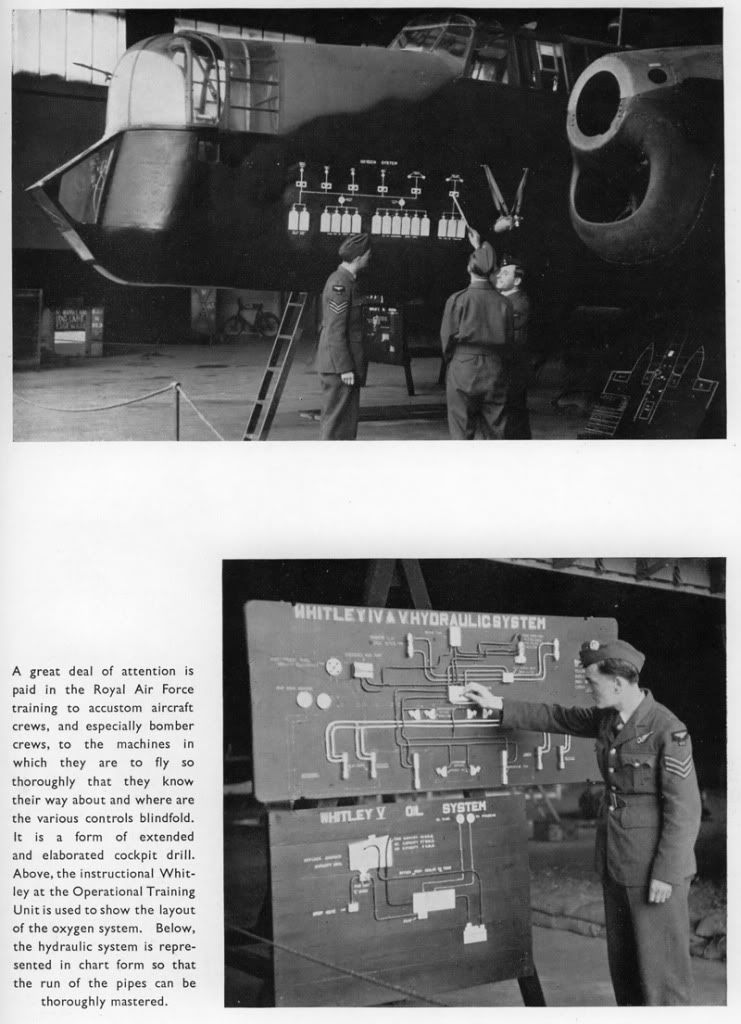 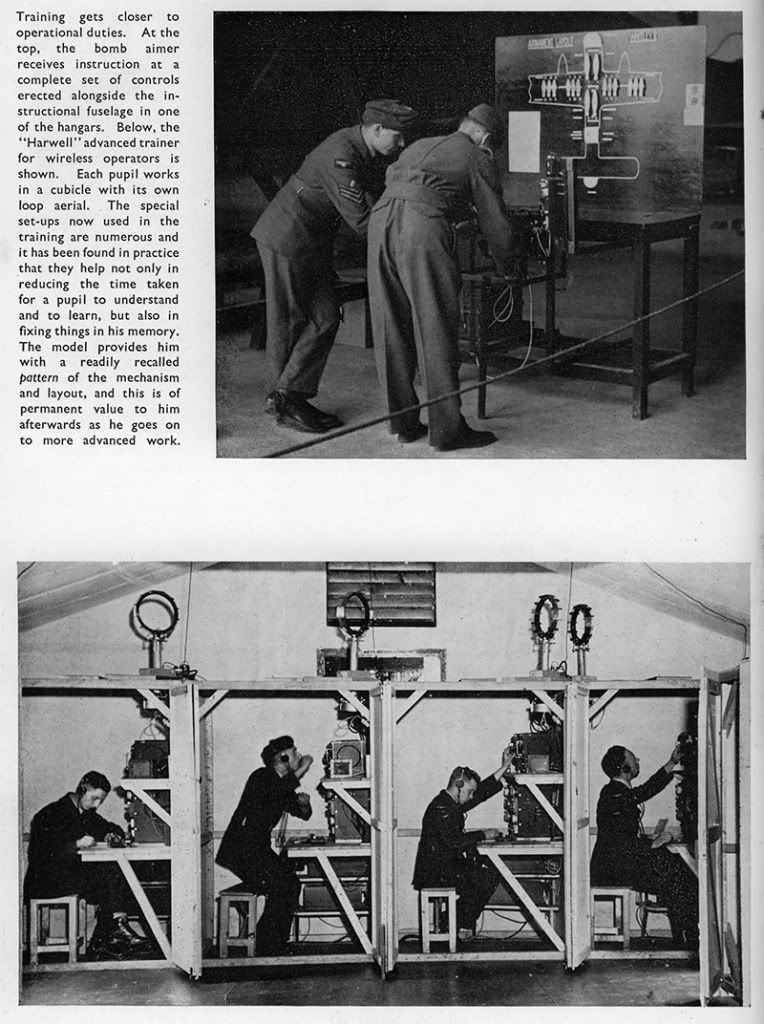 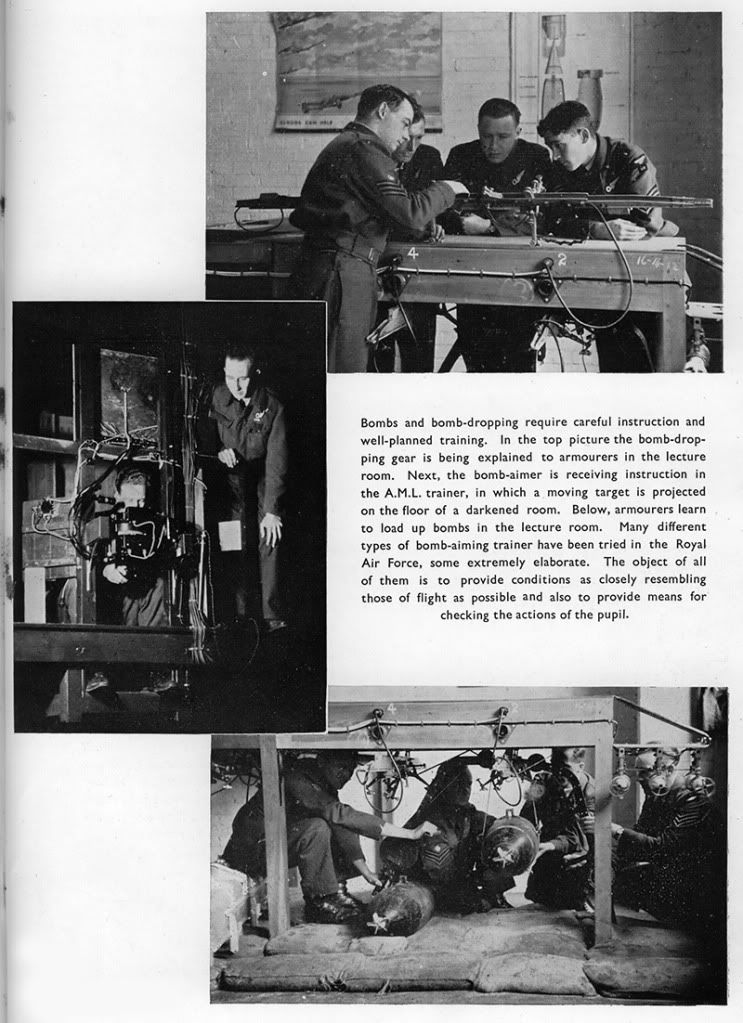
My 'Waiting for Clod' thread: http://tinyurl.com/bqxc9eeAlways take sides. Neutrality helps the oppressor, never the victim. Silence encourages the tormentor, never the tormented.Elie Wiesel. Romanian born Jewish writer, professor, political activist, Nobel Laureate, Holocaust survivor. 1928 - 2016. Indeed the safest road to Hell is the gradual one - the gentle slope, soft underfoot, without sudden turnings, without milestones, without signposts. C.S. Lewis, 1898 - 1963.
|
|
#3045230 - 07/03/10 07:00 PM
 Re: While we're waiting for BoB SoW: WWII BBC RAF Broadcasts
[Re: RedToo]
Re: While we're waiting for BoB SoW: WWII BBC RAF Broadcasts
[Re: RedToo]
|
Joined: Nov 2005
Posts: 3,070
RedToo

Senior Member
|

Senior Member

Joined: Nov 2005
Posts: 3,070
Bolton UK
|
Part 68. Sorry it�s a day late RL interfering! January, 1941 TALK BY THE C.O. OF AN AUXILIARY FIGHTER SQUADRON The Squadron Leader Commanding No. 602 (City of Glasgow) Auxiliary Squadron, who is the author of the following account, has been with the squadron since the war. He was on patrol with it when it helped to bring down the first enemy bomber to be destroyed over England and he went south with the squadron when it moved to help in the defence of London as the "Blitz" began. Now the score of the squadron is eighty-nine enemy aircraft known to have been definitely destroyed and twenty-five more probably destroyed. AFTER four months' fighting in the South of England my squadron has just come out of the front line, as it were, to an aerodrome in a quieter part of the country up north. And it is good to be able to relax a bit. We have had our casualties in those four months, six pilots in the squadron were lost. But not one was actually killed in the air by the enemy. During this time scarcely a day passed without a combat. On many days we were sent up half a dozen times to fight battles, often against large formations of the enemy. In the circumstances we consider our losses were astonishingly light. On the other hand our "bag" of enemy aircraft was eighty-nine destroyed and confirmed, many probables and damaged. So the Germans paid a stiff price for our losses, and each new successful engagement gave us fresh heart for more. My unit is the City of Glasgow Squadron, one of several Auxiliary Squadrons which have been fighting in the south, and it might interest you to know how we come to be in this war, and what our experiences have been. The story perhaps will answer for similar squadrons from other parts of the country. I joined the squadron six years ago, shortly after leaving school, and began my flying career with them. The squadron had already been in existence for nine years, and for four years after my entry continued to engage in bomber training. Then, to the delight of every member, we became single-seater fighters. At once we got down to some really serious training. We had our civil occupa�tions to attend to, but every week-end and several evenings a week we put in learning all we could about fighter tactics. It was just as well we did, for six months after this development the war broke out. Within six weeks of hostilities, the squadron was engaged in the first Fighter Command action of the war� the raid on the Firth of Forth on October 16, 1939. In that action the squadron helped to shoot down the first enemy aircraft to be lost in the present war over British soil. I had nothing to do with it personally. In fact, I distinguished myself by being about the only person in the squadron who did not fire his guns at something Teutonic that day. Truth is, I never saw any German aircraft in the air while I was up. My record up till early this summer consisted of having seen two German aircraft in the air when I was on the ground, and two on the ground when I was in the air. But not one sausage did I see in the air while I was flying. One night in June, however, when I was on patrol, a Heinkel came my way�caught in the beams of several searchlights. This turned out to be my first victim. When the target aircraft is brightly illuminated, as this one was, it becomes fairly easy to shoot it down, as you have the advantage of seeing without being seen. The one difficulty I did find was to be able to gauge the height of the target, since there is no background to it. It looks like something sitting stationary in mid-air, when, in fact, it is travelling at 200 m.p.h. or there�abouts. After my debut, as one might call this combat, the squadron had several encounters with reconnaissance aircraft, mostly in ones and twos, over the North Sea. But it was not until my squadron moved south, sometime after I had been given command of it, that we encountered the real "Blitz". Soon after this, on one particular patrol, we were told to inter�cept a raid of about one hundred enemy aircraft which were coming in from the south. We were informed that their height was about 8,000 to 10,000 feet and that just about that height there was a heavy layer of cloud. Consequently we split into two flights. One flight, which I was leading, went above the clouds. The other remained below to make sure we did not miss the raid by being on the wrong side of the cloud layer. As you can well understand it is not possible for a pilot when flying an aircraft to hear any outside noises, and one has to rely entirely on seeing one's quarry. As it happened, on this occasion, we did hear something of our prey. The enemy were using a wireless frequency which must have been very nearly the same as our own, for presently we began to hear them chattering away to each other like a lot of monkeys in a box. Up to this time we had seen nothing of our quarry, and as we approached them the chatter grew louder and louder. Then, suddenly, we spotted them. They were straggled out in large "vicks" of about eighteen aircraft in each, just above the clouds. As we were only six in number, against their one hundred or so, we saw them a long time before they saw us�which, of course, gave us a big initial advantage. We were able to climb above them and get out in front of their leading formation. As we approached nearer, the Huns suddenly spotted us and, above all their chatter, a some�what agonized voice came through as clear as daylight�"Achtung. Achtung! Schpeetfiren!!" At that, an amazing transformation took place�and the straggling formation closed up into a formidable mass, the Me. 110s wheeling out from the front to form a protective circle round the bombers. Thanks to the advantage we had in position, three of us were able to dive head-on into the leading formation, whilst the other three stayed behind to play with the fighters. The leading forma�tion of bombers broke up after our attack, and in ones and twos they sought refuge either in or below the clouds. Those who were stupid enough to go below the layer of cloud were pounced on by our other flight which was still waiting for them. Theirs was a sort of vulture's job, and like vultures they did it. And then we all returned safely. Which reminds me. A very great friend of mine, who was one of the best fighter pilots in the country�but who unhappily was killed in action recently�once said to me: "You know, Napoleon used to say 'Don't give me clever men�give me lucky ones'." Well, there seems to be a good sprinkling of lucky ones in the R.A.F. Touch wood, I've been pretty lucky myself. I've forgotten how many combats I've fought. But, with a score of eight, confirmed, as a result of my fighting, I've never once been hit. Nor has my aircraft. Even more remarkable, another member of my squadron, with a score of twelve enemy aircraft to his credit, all confirmed, has never once been hit either. There was a dent on his tailplane one day, but it appears that the mark was caused by a stone. The best "bag" the squadron had in one single action was on a day in August when we were detailed to intercept a raid coming in over Dorset. Once again we had the advantage of height, and this time of the sun also, and arranged to knock down twelve of the enemy, with a loss to ourselves of only two aircraft�the pilots of both of them safe. The enemy were very strong in numbers, but they split up and fled back to France. One of the two pilots of my squadron who baled out, landed in a farmyard where he was promptly cornered by a lot of irate farmers armed with pitchforks. That reception, the pilot said, was much more frightening than the baling out. Actually, on that day, so many people were floating down by parachute at the same time�mostly Germans I'm glad to say�that it must have looked rather like an invasion army being landed. While on the subject of coming down by parachute a rather amusing incident occurred on another occasion. A very fat man baled out of a Dornier which the squadron had intercepted at about 25,000 feet. Needless to say everyone thought it was our old friend Goering doing another of his celebrated reconnaissance trips over this country! We circled around him while he was coming down�and it was ludicrous to see this enormously fat man dangling at the end of his parachute harness with his two podgy arms stretched above his head. His landing was even more ludicrous. He touched down on the roof of an outhouse in a garden in Kent, went crashing through the roof, and remained there with only his head sticking through. The last we saw of him was his parachute descending slowly on top of him, obscuring the whole picture. Finally, I would like to take this opportunity of saying a word about the ground crews. It is usually the pilots who get the praise and the thanks. But the job we do is little in comparison with the excellent and unremitting work done by the fellows who keep us in the air. They work for us day and night and I never hear a grumble from any of them. They are just grand, and if any of them are listening in just now I would like to say, speaking, I am sure, for all pilots, ""We take off our hats to them." 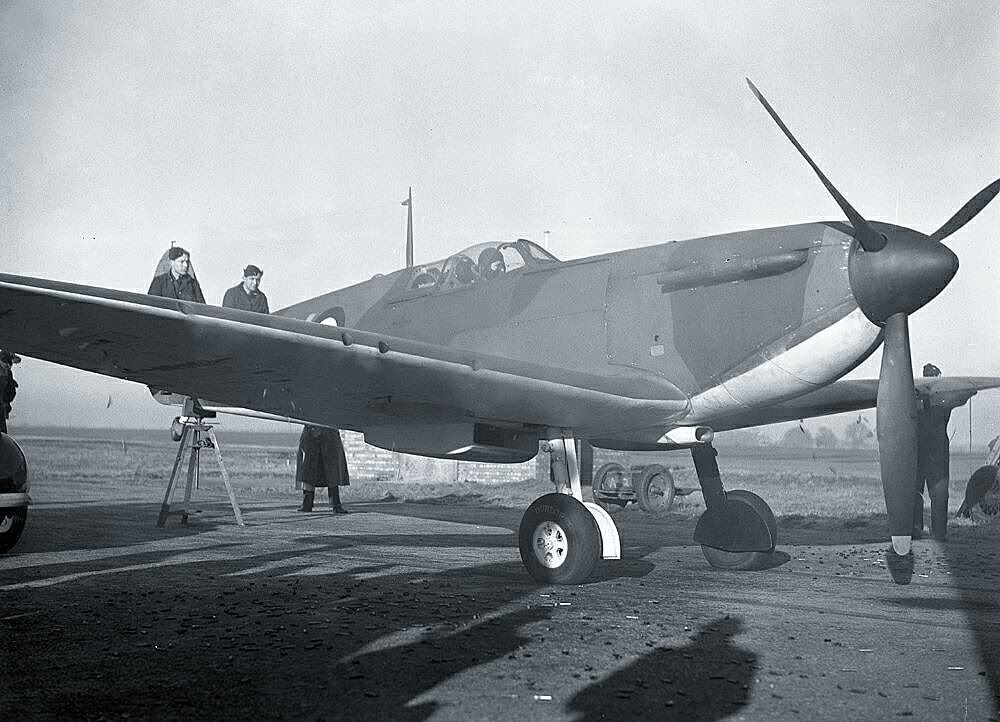 A Spitfire Mk Ia of 602 Squadron in early 1940. A de Havilland 3 blade propeller unit is fitted, along with a "blown" canopy and the laminated bullet proof windscreen and later aerial mast. The brass plate below the external starter plug can be seen on the side engine cowling.
Last edited by RedToo; 07/03/10 07:02 PM.
My 'Waiting for Clod' thread: http://tinyurl.com/bqxc9eeAlways take sides. Neutrality helps the oppressor, never the victim. Silence encourages the tormentor, never the tormented.Elie Wiesel. Romanian born Jewish writer, professor, political activist, Nobel Laureate, Holocaust survivor. 1928 - 2016. Indeed the safest road to Hell is the gradual one - the gentle slope, soft underfoot, without sudden turnings, without milestones, without signposts. C.S. Lewis, 1898 - 1963.
|
|
#3048699 - 07/09/10 08:27 PM
 Re: While we're waiting for BoB SoW: WWII BBC RAF Broadcasts
[Re: RedToo]
Re: While we're waiting for BoB SoW: WWII BBC RAF Broadcasts
[Re: RedToo]
|
Joined: Nov 2005
Posts: 3,070
RedToo

Senior Member
|

Senior Member

Joined: Nov 2005
Posts: 3,070
Bolton UK
|
Part 69 January, 1941 A STATION COMMANDER LOOKS BACK BY A GROUP CAPTAIN OF FIGHTER COMMAND I HAVE been asked to tell you something of what goes on at a Fighter Station. I'll try to do this by "looking back" over the War in so far as my station was concerned. We all knew, of course, it was going to be an Air War, and you can imagine, therefore, our intense excitement when war was actually declared. But how different those first seven or eight months turned out to be. There was no immediate "blitz", and my pilots spent their time incessantly chasing the odd elusive Hun far out over the North Sea, with only here and there a success. I remember �in those early days, the shrieks of almost childish joy with which the very sight of an enemy aeroplane was hailed by our boys in the air, and the tears of anguish when one got away by diving into clouds after a long chase, far out over the North Sea. Little did we know then that the Hun was progressively to switch the whole weight of his Air Force�on to a single objec�tive . . . and our turn was not yet. Little did we know then of the intensive air fighting that was so soon to come. And then came a red-letter day. May 16th, saw the first Spitfire Squadron leave my station to make an offensive sweep over the Continent. Two hours later the squadron returned, having patrolled as far north as Ostend. The enemy had not been engaged, but throughout the whole station there was a feeling of satisfaction and anticipation�that at last things were begin�ning to move; and a few days later, on a similar patrol, a Junkers 88 was shot down in a smother of sand near Flushing. ... I remember the high excited voice, the breathless excitement of the youngster as he "hared" home to report in person. His little dance of joy on the aerodrome as I met him�bright-eyed� indescribably happy. Less than a week later was to see the great Battle of Dunkirk, and the evacuation of our Army in the face of the whole might of the German Air Force. How can I begin to describe those momentous days? What a target those beaches were�right on his own door-step . . . crowded with the flower of the British Army�and the sea between these shores and the Dunkirk jetty �stiff with troops in every conceivable kind of boat, barge, tug and paddle-steamer�until the way home looked for all the world, as one of my pilots described it to me, "like Piccadilly in the rush-hour". What a task�our fighter squadrons had to keep the bombers away from those beaches�from the ships loading up�from the long procession home. I wish I could give you the picture as I saw it. How heroic�ally they fought�from the dark of four in the morning to the dark of eleven at night out and back, out and back, facing the whole might of the German Air Force�protecting a target such as the Hun must have dreamed about. For eleven days, hour after hour, my squadrons fought him away from those beaches, and from dropping his bombs . . . fought him�heavily outnumbered. Load after load of bombs were jettisoned harmlessly in the sea as our Fighters went into the attack, and many a bomber fell with them�whilst the unarmoured Messerschmitt fighter of those days were "easy meat"�and the "bags" obtained were terrific. On one day alone my station destroyed thirty-one enemy aircraft, and during those eleven days my squadron alone destroyed one hundred and twenty, and a further seventy-five so badly damaged that they probably never reached their home bases. Nice work that, when one remembers that we were fighting with every tactical dis�advantage, fighting over enemy territory, and against odds of often seven and even ten to one, and yet our losses were less than one-tenth of the confirmed casualties inflicted on the enemy. But what a strain it was�a strain that could be seen in the faces of my boys, as towards the end of those eleven days, they went into action dizzy with fatigue�but well knowing in their young hearts how much depended upon them. But they came out of it�as they went into it, with a light heart and a smile�and there was never a day so grim that my pilots failed to make it less grim, by their spontaneous humour� often spoken to themselves in the air. . . . What a joy it was to me, directing their efforts in my Operations Room, to hear�in the middle of a dog-fight�the radio silence broken with a "Oh! Boy, look at that so-and-so going down", or the solicitude for each other: "Look out, George, there's a 109 on your tail," and the calm, unhurried: "O.K. Pal," of the reply. Perhaps the following incident may give you some idea of the spirit in which our pilots sailed into the enemy. One of my Squadron Leaders had been shot down on Calais aerodrome, which was expected to fall at any moment into the hands of the Hun. It seemed just possible, if there was no delay, to pick him up before he was captured, and so I sent out the only two-seater I had, an unarmed and vividly painted Training machine. I sent a couple of Spitfires also to escort it there and back. It landed all right at Calais, and as there was a lot of cloud overhead one of the Spitfires stayed above, whilst the other remained below. The Spitfires were in radio touch with me, and in a few minutes, this is what I heard: "Hey, Al, there's a whole horde of 109s arriving", and the reply from the Spitfire below, "O.K., Johnnie, keep 'em busy, I'll be up in a minute". But the 109s, nine of them, dived past the "above-guard" and on to the tail of the Training machine, which had just taken off with the missing squadron-leader on board. The pilot of the Trainer "hoicked" about all over the sky in a frantic effort to shake the enemy off his tail. By this time though, our two Spitfires had got amongst the 109s and proceeded to shoot down three in flames; several more were probably destroyed but were not actually seen to crash. The Trainer meanwhile had nipped back on to the aerodrome again, the occupants taking cover in a ditch. The surviving 109s made off, leaving our two boys in complete possession; but with no ammunition and little petrol left, they could but join up, wave good-bye, and set course for home. Over the Channel, homeward bound, suddenly I heard this bit of chat: "Hey, Johnnie, your machine is full of holes", and the reply, "O.K., keep going, I'll have a look at you". There was a pause, and then: "You're just as bad yourself", and the reply, "I don't give a so and so�I'm going to do a slow roll. Boy, am I happy?" The unarmed Trainer took off from Calais later, an hour before it might have been captured by the Hun, and, unescorted, hedge-hopped its way safely home. And, so with the 4th June, the Dunkirk days were over. What a difference the complete collapse of France which followed meant to us. Now we were faced with the enemy a few miles across the water, and rapidly occupying aerodromes all along the French and Belgian coasts. From these bases�from June to the begin�ning of August�he concentrated his attacks on our shipping. Often my squadrons were engaging odds of anything up to ten to one, and rarely less than five to one, but in six weeks, fighters from my station added a further one hundred and thirty-five enemy aircraft destroyed, together with another sixty probables to their "bag". I remember during this period that one of our squadrons, which was in four engagements on one day, destroyed twenty enemy aircraft, for a loss of only two of their own pilots. One pilot "wrote-off" five Huns all in a row on the same day. Another two lads between them got six 109s and shot up a German E-boat in the Channel for good measure. And then suddenly in mid-August, the Hun switched his offen�sive against our shipping, and for about a month launched a bitter and relentless attack against our fighter aerodromes, admit�ting by this change of tactics, that our fighters were getting the upper hand of him, and that his only hope was to smash them and break their morale. By sheer weight of numbers he hoped to do this, and to blot out the "hornet's nests", which alone stood between him and the daylight annihilation of London. Hundreds of bombers, supported by high flying fighters, came over day after day�but more and more of the all-important bombers fell to my squadrons, and still we stayed on top. Steadily we took our toll, until in the end even the Hun couldn't take any more. During this short period we added another one hundred and twenty-five destroyed and from the air the Thames Estuary and Kent could be seen strewn with his wreckage. I hope I'm not giving you the impression that all this was "just too easy"�it wasn't . . . here and there, we had to "take a bit" ourselves. I well remember the days when his bombers got through . . . and fairly blew blazes out of my station�on one occasion twice in one day, until the whole place was rocking. I remember thinking after each attack how incredible it was that so many bombs could fall all together�produce such an inferno of noise�blot out the station and aerodrome with their black and yellow smoke, in so short a space of time . . . and yet, when the smoke cleared, do so little real damage. But then, we were always a lucky station. I remember every man and woman "turning to" and filling in the hundreds of craters, rushing round in circles organizing the labour�"rounding up" steam-rollers from near and fat. I remember also the fabulous bills that came in to me afterwards for free beer which I had promised . . . but it was well worth it�we were never out of action for a single day. And then, about the 7th September, the Hun ceased his attacks on our fighter aerodromes. From then on throughout September he threw the whole weight of his attacking forces against London. Over came the same large formations in broad daylight, but now, with a single objective�London. What a party that was! and what a beating was administered to his Luftwaffe! Do you remember such days as the nth, 15th and 27th of September, when our fighter squadrons shot down well over three hundred enemy aircraft on those three days? And that total does not include those who managed to limp home with a packet of trouble on board, or failed and fell in the sea. When October broke the Hun had had enough of daylight raiding, and from then onwards took to the night bombing of London and elsewhere; contenting himself by day with swarming over Kent with enormous numbers of his high flying fighters� some of which carried bombs. These "tip-and-run" raids, mostly at 30,000 feet and over, were designed to wear out our pilots and were more difficult to deal with. These two months were, comparatively speaking, bad ones for my station, but somehow we managed to chalk up another eighty-two destroyed and thirty probables. This "falling off" in our batting average was relieved, however, by one or two amusing features. The Eyeties showed themselves. One day they ventured too near the Thames Estuary, and I swung one of my squadrons on to them. I asked the squadron leader afterwards why there was such complete radio silence once he had sighted the enemy. His reply was: "Well, sir, when I saw who they were, I was quite speechless with surprise�and before you could say Jack Robinson we'd got seven of them." This same squadron a few days later was on patrol in the Maidstone area when the Naval Authorities at Dover rang up and said that there was a solitary German bomber "inconvenienc�ing" our shipping in the Thames Estuary. "Could we deal with it?" they asked. We said we would be delighted to, and as there was nothing else German about, the whole squadron was sent to intercept him�and a "free for all" followed as he raced for home. But he was too late, and was shot down in the sea. I heard about his fate by radio from the squadron leader, and rang up Dover to inform them that we had disposed of their "inconvenient" bomber�a Dornier 17. I asked that a boat should be sent out to pick up the crew� before the Germans, themselves, rescued them to fly again. "All right," came the reply, "but is this the Hun I phoned you about a few minutes ago?" On my replying "Yes," he rang off with a � "What service!" And so I come to the end of my story and as I look back what a glorious fifteen months these have been. Little did I dream when 1 took over my station, of the history that would be made there. Eight hundred enemy aircraft accounted for�five hundred and twenty odd destroyed, and nearly three hundred probables. As I look back�what memories come crowding in, and of this cherished store�what are the things I like most to remember? First of all I like to remember with a grateful heart, what a privilege it has been to serve and live amongst the people of my station. Of the happy spirit that permeates my station�and all those unsung airmen and airwomen who have worked so unceasingly�so uncomplainingly, day and night to keep the air�screws turning. Their loyalty and confidence in me, which has made my work such a joy. I like to remember, and if I may, to thank all those kind people who, anonymously, have sent cigarettes, sweets and other comforts for my pilots and my people. So many came from the East-end of London�surely no better tribute to my pilots. Of them, I like to remember, their simple modesty, and the way they could always raise a laugh, as, over their half cans of beer at the end of each interminable day's fighting in the summer �they swopped experiences�tired to death but unconquerable of spirit. Do you remember those understanding, inspiring, and surely immortal words of Mr. Winston Churchill: "Never in the field of human conflict was so much owed by so many to so few." I do, for I have seen the valour of their ways. 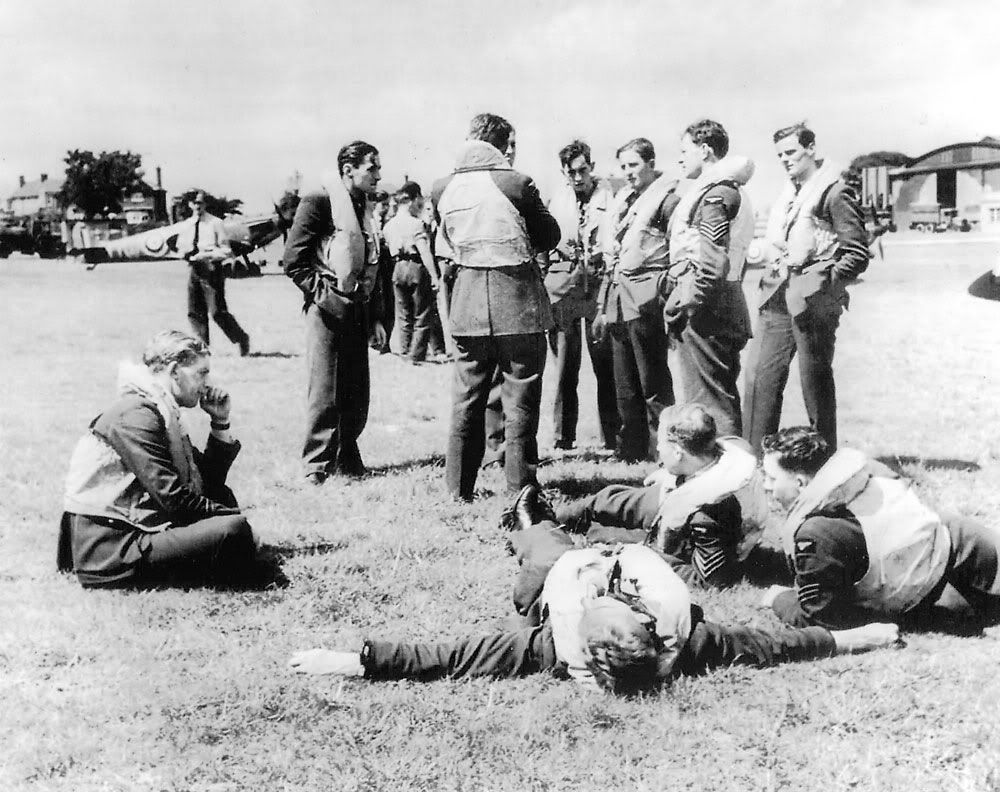 Pilots of No. 610 Squadron at Hawkinge on July 29th 1940. Standing extreme left is Pilot Officer Stan Norris, who later the same day, forced-landed in a Spitfire damaged in combat. Standing fourth from the right is Sergeant Norman Ramsay. July the 29th was his 21st birthday. Both survived the war. 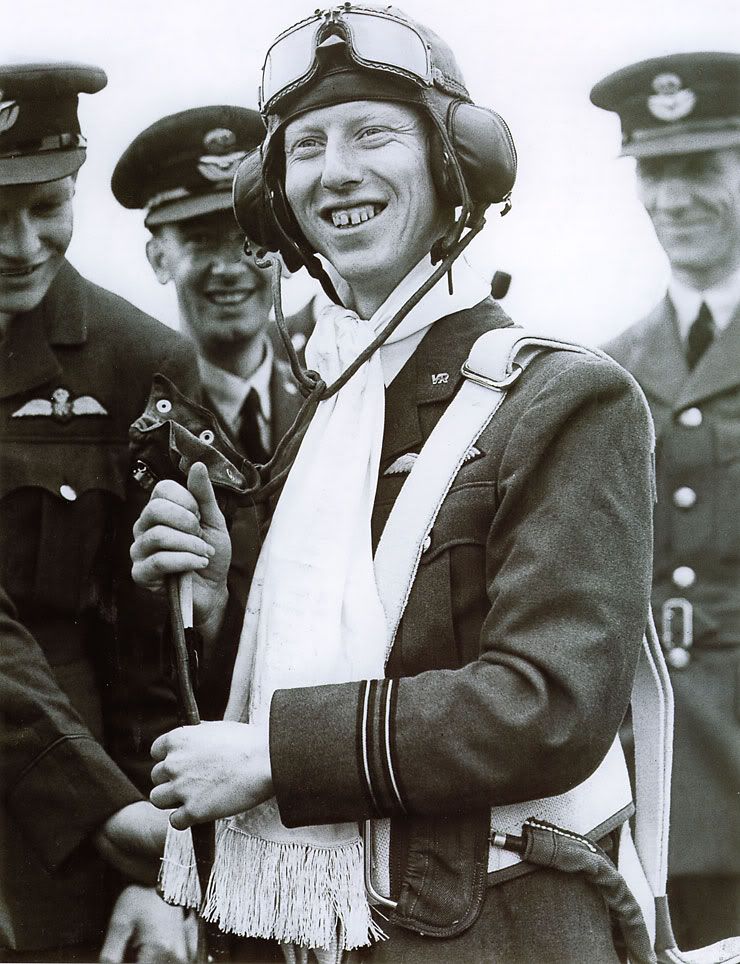 James �Ginger� Lacey brought down more German aircraft than anyone else during the Battle of Britain with a tally of 18. In July 1940 he was awarded a parachute and scarf in recognition of his actions in bringing down a Heinkel which had bombed Buckingham Palace. He is photographed wearing the parachute and scarf made specially for him. The scarf bore all the names of the workers in Australia who made the parachute for him.
My 'Waiting for Clod' thread: http://tinyurl.com/bqxc9eeAlways take sides. Neutrality helps the oppressor, never the victim. Silence encourages the tormentor, never the tormented.Elie Wiesel. Romanian born Jewish writer, professor, political activist, Nobel Laureate, Holocaust survivor. 1928 - 2016. Indeed the safest road to Hell is the gradual one - the gentle slope, soft underfoot, without sudden turnings, without milestones, without signposts. C.S. Lewis, 1898 - 1963.
|
|
#3053812 - 07/16/10 07:54 PM
 Re: While we're waiting for BoB SoW: WWII BBC RAF Broadcasts
[Re: RedToo]
Re: While we're waiting for BoB SoW: WWII BBC RAF Broadcasts
[Re: RedToo]
|
Joined: Nov 2005
Posts: 3,070
RedToo

Senior Member
|

Senior Member

Joined: Nov 2005
Posts: 3,070
Bolton UK
|
Part 70. January, 1941 RAID ON ITALY BY A WING COMMANDER CO. OF A HEAVY BOMBER SQUADRON AT two-thirty on the afternoon before this raid which I am going to describe, the squadron was called together. I called out the names of the pilots and this is briefly what I told them: "We are on Italy to-night. The primary target is the oil refinery and storage tank at Porto Marghera, Venice. This is one of the most important targets in Italy and it is our job to blot it out. The distance is about seven hundred miles each way allowing for no strays, and as you know, it means crossing the Alps at 17,000 feet. The vital part of the target�the refinery itself, is comparatively small and is situated on a small peninsula. The amount of petrol you will carry will be enough to get you there and back with a good margin in hand, but watch your petrol consumption carefully. On your return there is likely to be fog at base and you may have to be diverted to aerodromes rather further away. You will be returning at dawn. "Take all these things into account and decide for yourselves how low you can allow to come down to bomb over the other side of the Alps, remembering the lower you go the higher you've got to climb to get back over them on your return, with resultant higher petrol consumption. I want to stress that the target is a vital one and it is going to be a terrible waste of effort if we fly all that distance and then don't make absolutely certain of getting it." That, as I said, is briefly what I told my squadron at two-thirty that afternoon. The short account of the trip that I'm now going to give you is told merely as one of the pilots who took part in the raid and something very like it might equally well have been given by anyone of the others. At nine o'clock I was sitting in my aircraft warming up the engine when an order was received to shut off engines and stand by for further instructions. I thought: "Well, that's as far as we shall go on this trip. Here am I all dressed up like a Christmas tree and nowhere to go." But about fifteen minutes later, the order came through that we were to go, so we started the engines again and eventually took off. Conditions then were rather bad. We got on to our course and climbed steadily until we got above the clouds over the English Channel. We saw no ground at all until we crossed the Rhine Valley. Here the clouds had cleared and with an almost full moon and snow on the ground it was as bright as day and we could see the peaks of the Alps many miles ahead of us. We began to climb�using oxygen now of course�until we reached 17,000 feet where the rarefied air was so clear that one could almost see from one end to the other of the Alpine range. It was a rather awe-inspiring sight with the valleys all filled with fog and those great jagged snow-covered peaks sticking out; like a popular conception perhaps of Antarctica, made more realistic by the intense cold. As we came over the Alps the fog seemed to stretch away into the Lombardy plains and I began to wonder whether our flight was going to be a fruitless one. However, the fog gradually gave way to haze, and the haze, as we went on, gave way to glorious visibility. I was losing height all this time until we were 6,000 feet, at which height we picked up the Adriatic, and there was Venice on our right with the Lido stretching away beyond it. It was the most perfect night imaginable and I must say that, as a night-bomber pilot, accustomed to the cover of darkness, I felt terribly naked but not ashamed, and sailed sedately along in almost daylight conditions in our monster aircraft. We flew round the area for five or ten minutes and then I decided that a low-level attack was indicated. We came down almost to ground level to the north-east of the target and flew towards it, passing just to the side of a largish fort where two sentries fired at us with rifles. On the way down I had given orders to my two gunners that they were to open fire on anyone who opened fire on us. I only hope those two sentries went to ground very quickly. We flew straight over the centre of Mestre�the town which lies at the far end of the causeway leading to Venice and next to Porto Marghera. We were flying just above the rooftops. The streets were empty save for a few people. We heaved the aircraft up over a line of factory chimneys and there was the target in front of us. I climbed rapidly to 700 feet; the bomb aimer selected the biggest bomb we had, a really huge one, and let it go at the right place. The result was terrific. The aircraft was thrown bodily upwards and I thought we had got a direct hit from a shell. I enquired quickly whether there was any of the aircraft left and an excited reply from the rear gunner told me that it was our bomb going off. He said it had gone off immediately beside the large pumping station which we had been aiming for and that a colossal belt of smoke and flame had come up to more than half the height of the aircraft and there was a tremendous blaze. The whole of this time tracer from the ground defences was whizzing past us in all directions. Looking back, it seems amazing that we weren't hit, but there wasn't a single bullet-hole in the aircraft when it was examined the following day. Both gunners were busy the whole time replying to this fire from the ground and, I hope, giving better than we got. We came round a second time to drop the remainder of our load. The bombs fell on or beside the fires started by the first bomb: there were more violent explosions and the fire was increased by half again. We came straight down nearly to ground level again, and picked up the railway leading to Padua, which is about twenty miles away, where I knew there was an aerodrome. We flew alongside three goods trains, all the drivers of which leaned out to look at us in the brilliant moonlight. One waved, another spat, and the third, I thought, looked anxious. We did not fire at them. Padua appeared. We whistled in and out of the tall spires which seemed to abound there, threw out leaflets then went on to the aerodrome. We swept the hangars and barracks with machine-gun fire. It must have been an extraordinary sight to see our great black bomber only twenty feet off the ground, clearly visible against the moon and snow, roaring and bucketing across the aerodrome at about 200 miles an hour with twin streams of gunfire pouring from nose and tail. The aerodrome defences were ready for us and opened fire with everything they had. I kept as low as I dared, making use of every bit of available tree cover. The tracer hopped along beside us parallel to the ground, but again we were not hit. And that was the end of the fun. We climbed up steeply to cross the Alps again. Fog and cloud were by now widespread and apart from the mountain range, little was seen of the ground until we crossed the Belgian coast. Dawn was just breaking when we landed in mist at our own aerodrome. The remainder of the squadron returned at intervals within the next hour. My tale is merely the tale of them all. They had all bombed from a low level. They had all scored direct hits. They had not wasted a single bomb. The long flight had been worth while. Only one aircraft failed to return. The raid referred to above took place on the 22nd of December 1940. It was carried out by 9 Squadron flying Wellingtons out of R.A.F. Honington. The aircraft that failed to return was L7799 WS-D which crashed at the Hamlet of Lullington Court near Alfriston. All members of the crew were killed. It is not known whether the aircraft was on its outward or return flight when it crashed 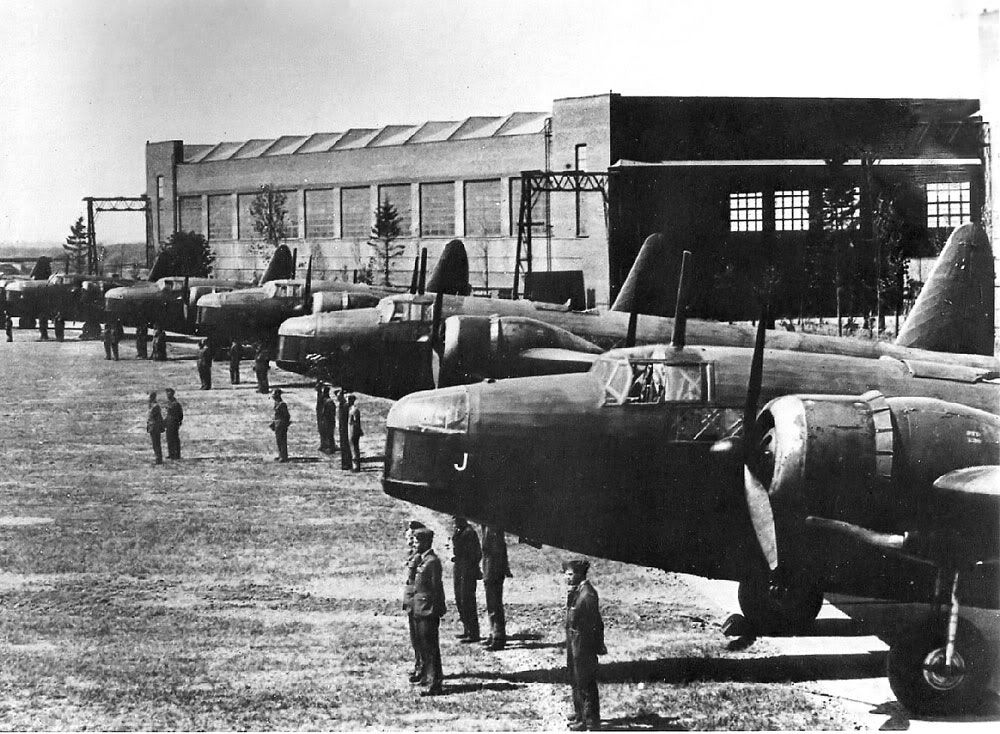 Early Wellingtons of 75 Squadron photographed at Feltwell in 1939. These aircraft were given to the R.A.F. by the New Zealand government.
Last edited by RedToo; 07/16/10 07:59 PM.
My 'Waiting for Clod' thread: http://tinyurl.com/bqxc9eeAlways take sides. Neutrality helps the oppressor, never the victim. Silence encourages the tormentor, never the tormented.Elie Wiesel. Romanian born Jewish writer, professor, political activist, Nobel Laureate, Holocaust survivor. 1928 - 2016. Indeed the safest road to Hell is the gradual one - the gentle slope, soft underfoot, without sudden turnings, without milestones, without signposts. C.S. Lewis, 1898 - 1963.
|
|
#3057853 - 07/22/10 06:27 PM
 Re: While we're waiting for BoB SoW: WWII BBC RAF Broadcasts
[Re: RedToo]
Re: While we're waiting for BoB SoW: WWII BBC RAF Broadcasts
[Re: RedToo]
|
Joined: Nov 2005
Posts: 3,070
RedToo

Senior Member
|

Senior Member

Joined: Nov 2005
Posts: 3,070
Bolton UK
|
Part 71 A day early � re-locating an abandoned cat we have adopted tomorrow night. January, 1941 RAID ON HAMBURG BY A CZECH BOMBER PILOT UP to this present time I am already on operations eight times against the enemy and now I am looking forward to many more missions. I am altogether nine years a pilot. When the Germans enter Czechoslovakia I escape to Poland. I am fifteen days only in Poland and then I come to England and here I am told that I should proceed to France with a group of twenty-five Czech airmen. I am wanting there to join the French Air Force, but there are difficulties. So instead I make application to join the Foreign Legion. All this group of twenty-five join also in accordance with advice from the Czech authorities in Paris and we go to Africa. At first we are employed as workers building highways. This was very difficult in the climate which is quite unusual for us. Then, after one time, we start with normal French drill infantry so that when these six months are over we can be regarded as French Legionnaires. During this time, however, the Czech authorities in Paris have made the necessary steps for us to join the French Air Force, and when at last they have succeeded in this all these Czech airmen in the Foreign Legion are sent to different stations in Morocco. I spend another two months as pilot in the French Air Force in Africa; then I am sent to France and then when France collapses I am coming to England. That is in August. When I am here it is not necessary for me to make personal application to join the R.A.F., because everything has been arranged for us beforehand and so, after a little time, I join the Czech bomber squadron. In these eight missions which I have made with them I am sent to eight different places, Berlin, Bremen, Hamburg, Wilhelmshaven, Essen, all in Germany and to these French Channel ports of Dunkirk, Calais and Le Havre. Three times I go as second pilot and then I am promoted captain of aircraft. The raid at Hamburg is my most successful, I think. This raid was made on a full moon night. We succeeded in making an approach almost unobserved with complete silence on the part of the German guns on the ground, but so soon as we drop our flare, then immediately this anti-aircraft defence starts most violently and there are many searchlight also. I will never forget these thirty minutes which we spend over Hamburg simply trying to find the target in the docks. All the time they are firing at us very much. Then mine observer tells me "O.K. Now I am bombing." He tells me it is very good, his bombing. I see a big fire start and then I hurry for England. At my first bombing missions I have felt some excitement, but now I am quite accustomed to it and I do not feel any excite�ment at all. Upon one occasion when I am second pilot we have to jump from our aircraft by parachute. To start with it was a very good flight this. We get to Bremen and we drop our bombs. Again these bombs are dropped at full moon and I am quite sure they are dropped on the docks. There is much anti-aircraft there also, but again we are not hit. In all these eight missions my aircraft is not hit. This time when we start to cross the Channel we are proceeding in cloud towards England and ice is starting to form on our aircraft. Because of these icing conditions our wireless set simply stops to work, so when we reach the shores of England we are without any guide at all. It is cloudy, windy weather, with complete darkness and we are about half an hour after midnight. It is so bad that at first we cannot recognise whether we are above the sea or above the land, though we have come down to less than five hundred feet. In the end we see the waves and the white foam and this enables us to recognise the shores. We are hoping that the wireless operator will succeed in repairing this deficiency in his apparatus, but it is not so. We remain in the air as long as fuel enables us to and then when we are still finding nowhere to land the captain is obliged to give this order to abandon aircraft. I am to go first. I shake hands with all of them and I go through the front hatch. We are now at two thousand feet. I make two somersaults and then I pull the rip-cord. I am wondering very much if this parachute is going to open. I have never jumped before. Then I have a feeling of the parachute coming out of its cover which is on my back and next there is a jerk when she opens and I start to swing in the air like a pendulum. It is raining very heavily and I am becoming soaked. As I descend, I notice a road. I shout, but apparently nobody is present. During this final period of descent I am prepared to land with my hands or my feet first, but unfortunately I first hit the ground with my face. I receive such a shock that it compels me to lie for some minutes to recover. Then I find I am in a meadow. I shout several times, but with no results so I fold my parachute over my arm and walk until I reach a house. When I knock on the door and shout again, there is a lady whose head appears from a window upstairs and I ask for help. This lady immediately vanishes and at once a gentleman appears in the same window with a gun which he points at me. When I see this gun, I am so weak already through all these events that I faint and next I find myself already in the house in an easy chair. When they have made sure of me they are very, very kind and they give me hot tea with whisky in it. The police and a doctor arrives with his car and he takes me to his house. He offers me a bath and pyjamas and a bedroom and something to eat and then I go to sleep. I am sleeping only for thirty minutes when the front-gunner arrives also. He explains that he had to hang for one hour from a tree with his parachute before succeeding to release himself and dropping to the ground. And soon after this incident we are back once more on operations. So now good night. No photos this week instead this link: http://www.fortunecity.com/greenfield/drongo/72/311photo.htmltakes you to a page of photos of the Czech bomber squadron � 311 Squadron.
My 'Waiting for Clod' thread: http://tinyurl.com/bqxc9eeAlways take sides. Neutrality helps the oppressor, never the victim. Silence encourages the tormentor, never the tormented.Elie Wiesel. Romanian born Jewish writer, professor, political activist, Nobel Laureate, Holocaust survivor. 1928 - 2016. Indeed the safest road to Hell is the gradual one - the gentle slope, soft underfoot, without sudden turnings, without milestones, without signposts. C.S. Lewis, 1898 - 1963.
|
|
#3063626 - 07/30/10 04:16 PM
 Re: While we're waiting for BoB SoW: WWII BBC RAF Broadcasts
[Re: RedToo]
Re: While we're waiting for BoB SoW: WWII BBC RAF Broadcasts
[Re: RedToo]
|
Joined: Nov 2005
Posts: 3,070
RedToo

Senior Member
|

Senior Member

Joined: Nov 2005
Posts: 3,070
Bolton UK
|
Part 72. January, 1941 RAID ON WILHELMSHAVEN BY A FLIGHT LIEUTENANT The speaker has been in the R.A.F. for fourteen years. He is thirty and has done one thousand and nine hundred hours' flying. Since the war began he has been on twenty-seven operational flights, including five over Berlin and one over Turin. On the night of January 16th, he was the captain of a heavy bomber which took part in the concentrated attack on Wilhelmshaven. THIS Wilhelmshaven raid was my first flight on coming back from leave, and I was rather glad to have it because the previous night Jerry had been over and kept my wife and me awake with a few bombs not many yards away from home. I thought it was nice to be able to return his visit so quickly. Over the North Sea we ran into thick cloud with a base at three thousand feet. I took the machine up to eleven thousand five hundred feet and avoided it, just skimming along the top. But that brought us into nastier stuff, electrical disturbances and, what was worse, icing. Blue flames were flickering round the airscrews and the guns. The aircraft was bumping about and it was hopeless trying to use our wireless. It was terribly cold�about minus twenty-nine degrees. At 12,000 feet we got clear of the cloud, except for one great whopper which we had to dodge. Forty miles from our target flak began to stream up from Emden; actually the ground defences were firing at another of our aircraft, and we skirted neatly round the barrage and sailed on to our target area. Once there we saw the thick black shapes of buildings standing out clearly against the snow. Some of our boys had already been over and had started five jolly good fires. There was one huge blaze which we reckoned to be about half a mile long and another big circular fire out of which ten explosions came just as I was running over my target. There was no need to bother about dropping any flares; the fires gave us ample light. I decided not to bomb the biggest fire which was doing very well for itself, so I just waited my time. Then I saw heavy flak being fired at someone on my right. It gave me my chance. While Jerry's attention was distracted we snooped in unobserved. In a straight run we dropped one long stick, and that brought the anti-aircraft fire on to us, but by turning round I was able to avoid most of it and swung away to have a good look at the damage down below. Our bombs had set ablaze a large area and we saw nine or ten explosions all of which were quite distinct from the bursts of our own bombs. We toured around for another five minutes though all the time the flak was getting heavier. The extra five minutes were worth while for at the end of them one of the fires we had started was running into another and the dark shadows thrown by the buildings on to the snow were being driven away by the light of the flames. There were many other aircraft over Wilhelmshaven and we saw bombs from some of them bursting squarely on decks and dock buildings. Chunks of debris went hundreds of feet into the air, and the job done we turned for home. It was very quiet going home until we got over the North Sea. Then my airspeed indicator got sulky and froze up on me. I thought I would go down to a warmer layer, but the cold clouds were almost down to sea level so I climbed back again to about twelve thousand feet and eventually got over the top and carried on home. There were one or two anxious moments when we were landing, for the airspeed indicator was still frozen up and when you have no idea of your speed it is pretty unpleasant landing in the dark. But we managed it all right; there was a kindly moon to help us. We all agreed that it had been a very good show. Pics of Hurricanes this week � running out of pics of Wellingtons! 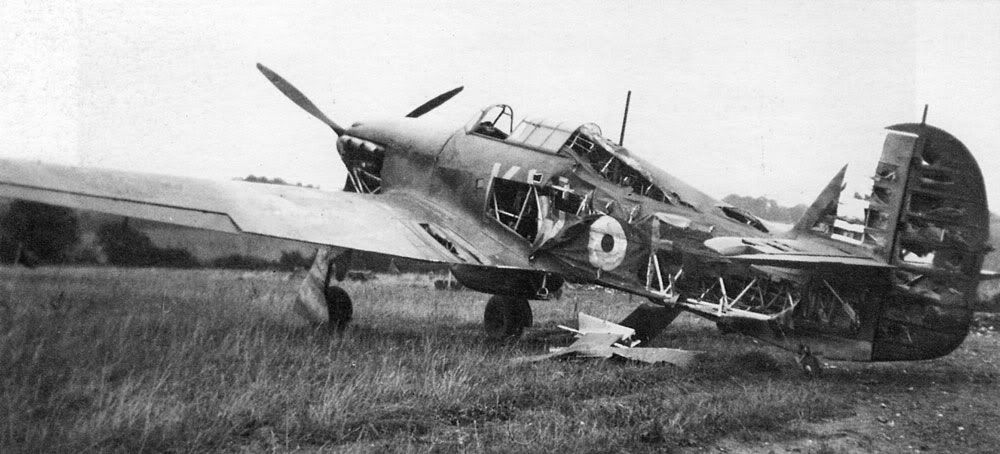 A Hurricane of 615 Squadron badly damaged at Kenley on the 18th of August 1940 during the Luftwaffe campaign against Fighter Command airfields in southern Britain. Interesting to compare this to the damaged BoB Sow Hurricane from Oleg�s 23 7 10 update: 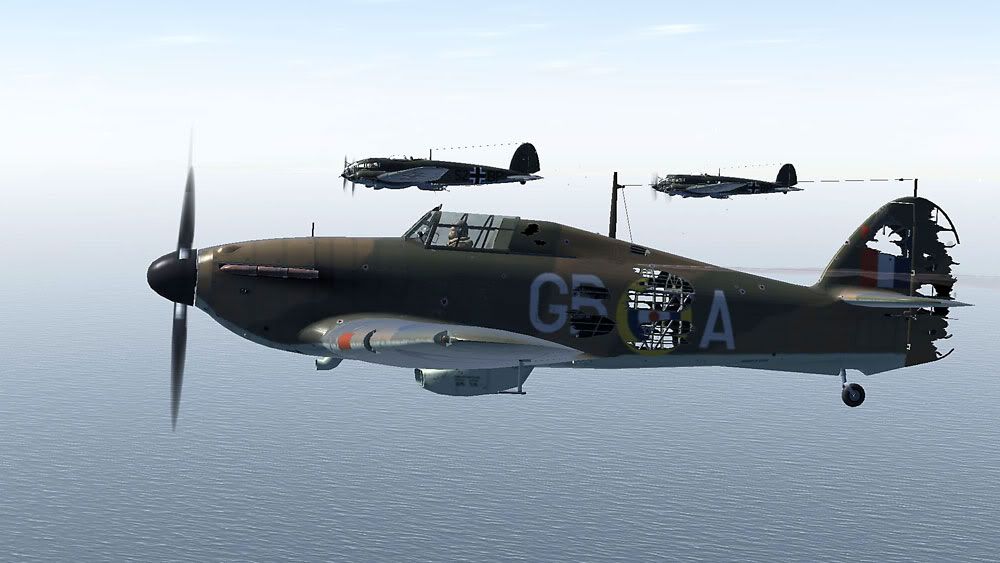 Very little loose canvas in Oleg�s Hurricane.
My 'Waiting for Clod' thread: http://tinyurl.com/bqxc9eeAlways take sides. Neutrality helps the oppressor, never the victim. Silence encourages the tormentor, never the tormented.Elie Wiesel. Romanian born Jewish writer, professor, political activist, Nobel Laureate, Holocaust survivor. 1928 - 2016. Indeed the safest road to Hell is the gradual one - the gentle slope, soft underfoot, without sudden turnings, without milestones, without signposts. C.S. Lewis, 1898 - 1963.
|
|
#3067039 - 08/04/10 08:26 PM
 Re: While we're waiting for BoB SoW: WWII BBC RAF Broadcasts
[Re: RedToo]
Re: While we're waiting for BoB SoW: WWII BBC RAF Broadcasts
[Re: RedToo]
|
Joined: Nov 2005
Posts: 3,070
RedToo

Senior Member
|

Senior Member

Joined: Nov 2005
Posts: 3,070
Bolton UK
|
Part 73. Two days early - on my hols tomorrow. January, 1941 RAID ON BREST BY A PILOT OFFICER THAT night we were just making an ordinary night attack on Brest harbour. We'd been there before, and we knew roughly what to expect. There was a bright moon when we got near the place, and the flak�the anti-aircraft fire�was coming up in much the usual sort of way. There were curtains of fire here and there, cones of fire over the more important spots and searchlights wandering all over the place. It was pretty cold, but you expect it to be cold at the height at which we were flying. Then suddenly the port engine stopped. My observer, who was in the nose of the aircraft, switched on the inter-communication telephone and asked: "What's happened?" "Port engine stopped," I told him. Then, just as I said it, most of the noise died out of the aeroplane, and I said: "Gosh, starboard engine stopped, too." "Well, here we go," said the observer. And that was all you could say about it. Both engines had iced up and stopped, and we were gliding, without any power, slowly downwards. I was not particularly worried at first. Engines do sometimes ice up and stop, and when you come down into warmer air, with any luck they pick up again. My only worry was to travel as slowly as possible, so that the glide would last as long as possible. The observer and I had a chat about it and decided that, as we were already over Brest, we might as well have a smack at the target, even without any engines. The flak had died away for the moment, so we started our first run in. By then we had lost about a thousand feet in height. We made a run across the target area, but we couldn't see the exact target we wanted, so we came round again and started another run, a few hundred feet lower. And we kept on doing that, a bit lower each time, for what seemed about ten years� although really our whole glide lasted for less than a quarter of an hour. By this time, of course, the German gunners knew we were there, and now and then they seemed to have a pretty good idea exactly where we were. There was one particularly nasty burst of flak all round us when we were about half-way down, and it shook the aircraft a bit, but we weren't hit. Every now and then a searchlight picked us up and I had to take avoiding action to get out of it. I didn't want to do that more than I could help, because every time I did it we lost a little more height, and shortened the length of the glide. Once I called to the air gunner to ask him if everything was all right. "Sure," he said. "May I shoot out some of these searchlights?" But I couldn't let him do that for fear of giving our position away completely. He was disappointed, and every now and then he came on the 'phone and said hopefully: "There's a searchlight on us now, sir." By the time we were down to about 4,000 feet, still without any engines, things began to look rather nasty. We were still gliding, and still making our runs over the target area, with the observer doing his best to get the primary target into his bombsight�and, of course, we were still losing height. To add to our worries, another Blenheim high above us, without the slightest idea that we were below, was dropping flares and lighting the place up. When we had lost another thousand feet, we ran slap into the middle of trouble. The flak came up like a hailstorm going the wrong way. But even then, by a stroke of luck nothing hit us. A little lower, however, our luck broke. The port wing stopped an explosive shell, which tore a hole two feet square in it. I called to the observer to get rid of the bombs on some�thing useful, because we hadn't got enough height to go round again. The observer released the bombs, and they fell near the entrance to the Port Militaire�and still we were gliding downwards. By now we were so low that we could see almost everything on the ground and in the harbour. I took one quick look over the side, but one look was enough. The tracer fire was coming up so quickly at us that I had to rely on the observer to direct me through the various streams of it. I had no time to watch it myself. The gunner got the dinghy ready in case we came down in the water, and he afterwards swore that he could see the black shapes of men by the guns on the ground, but I think it was probably the gun emplacements that he saw. Right over the middle of the harbour, at just about 1,000 feet, we were caught in a strong blue searchlight�and almost simultaneously both our engines picked up again. I raced out of the harbour, through even more violent flak, fortunately without being hit again, for at first the aircraft refused to climb. All the way home I had to keep the control wheel hard over to the right, to hold the damaged wing up, and several times the observer had to come back to help me hang on to the wheel, the pull was so heavy. We made for the nearest aerodrome in England, where they did everything they could to help us down. But directly I lowered the under-carriage the aircraft started to drop out of the sky like a brick. The only thing to do was to land fast, so the crew braced them�selves on the straps, opened all the hatches, and we came in just sixty miles an hour faster than the Blenheim's usual landing speed. Luckily the undercarriage was undamaged and we landed safely. Just one thing more. That aircraft is now in service again. The engineers worked on it night and day and, thanks to them, within three days I flew it back to my own aerodrome. Hurricanes again:  Testing a Hurricane�s eight machine-guns: a burst of 1,600 rounds with 1 tracer bullet in 4. 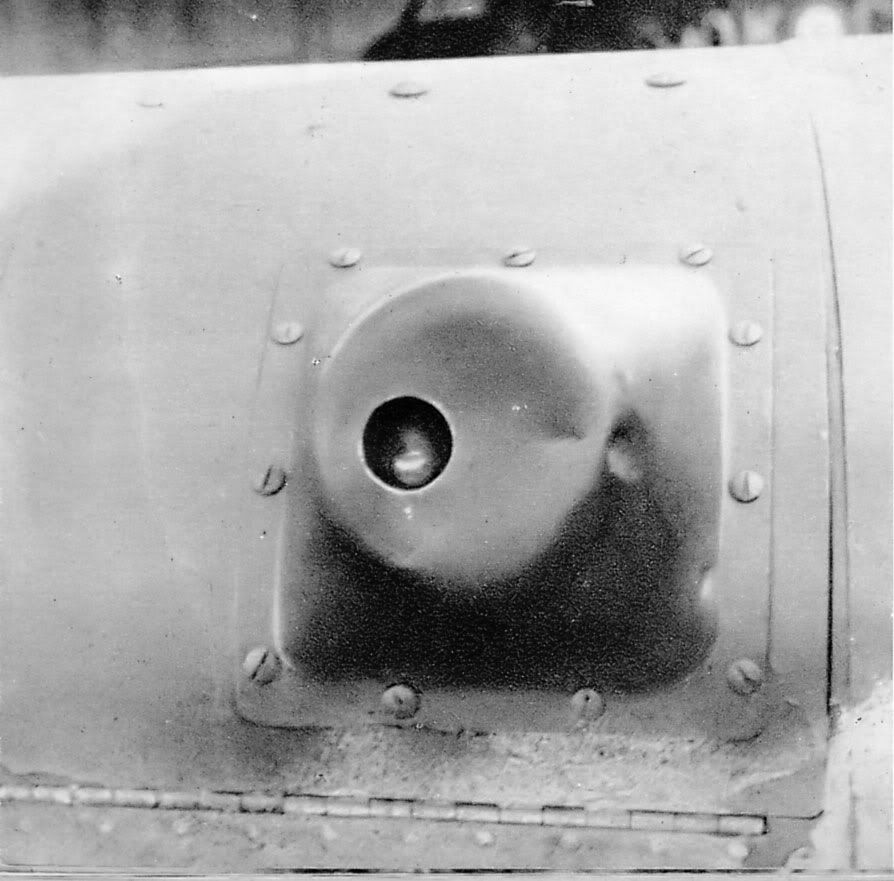 Outside view of a Hurricane�s gun-camera. 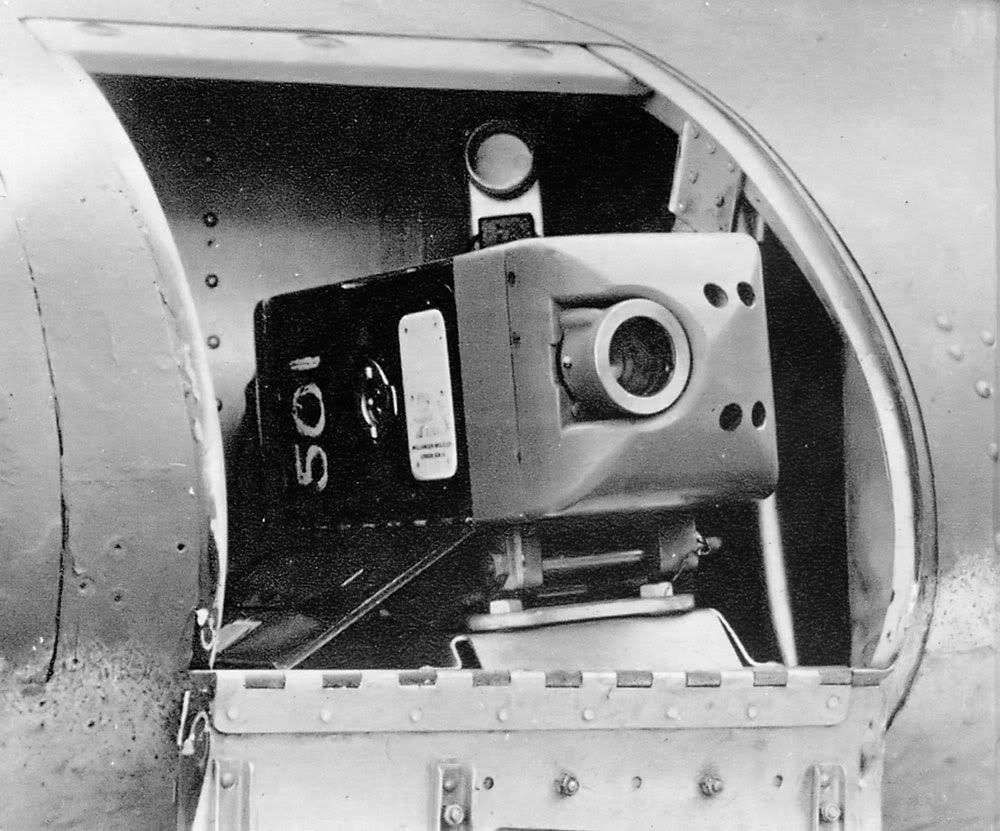 Inside view of the same � fitted just inboard of the guns on the starboard wing.
Last edited by RedToo; 08/04/10 08:28 PM.
My 'Waiting for Clod' thread: http://tinyurl.com/bqxc9eeAlways take sides. Neutrality helps the oppressor, never the victim. Silence encourages the tormentor, never the tormented.Elie Wiesel. Romanian born Jewish writer, professor, political activist, Nobel Laureate, Holocaust survivor. 1928 - 2016. Indeed the safest road to Hell is the gradual one - the gentle slope, soft underfoot, without sudden turnings, without milestones, without signposts. C.S. Lewis, 1898 - 1963.
|
|
#3072756 - 08/13/10 12:56 PM
 Re: While we're waiting for BoB SoW: WWII BBC RAF Broadcasts
[Re: Trooper117]
Re: While we're waiting for BoB SoW: WWII BBC RAF Broadcasts
[Re: Trooper117]
|
Joined: Nov 2005
Posts: 3,070
RedToo

Senior Member
|

Senior Member

Joined: Nov 2005
Posts: 3,070
Bolton UK
|
Thanks Trooper 117 Part 74. February, 1941 ADVENTURES OF A NEW ZEALAND FIGHTER PILOT IN THE R.A.F. This is the story of a twenty-three-year-old fighter pilot from Wanganui, New Zealand. Not only is he a squadron leader with a great many confirmed victories to his credit and the holder of the Distinguished Flying Cross and Bar, but he has himself been shot down seven times and has three times had to bale out from crippled aircraft. He has had a head-on collision with an enemy machine, has seen his plane blown up three seconds after abandoning it and has even been bombed on the ground when taking off. WELL, I certainly don't feel any the worse for my various adventures and I hope to do a lot more flying yet. When war broke out, for a long time life was uneventful. In fact our first engagement did not take place until the German army was half-way through France. But my adventures began with that first engagement and from then on they came pretty thick and fast. That first engagement was over Calais. Another pilot and I volunteered to escort a small training type aircraft to Calais aerodrome where the trainer was to land and pick up a British pilot who had force-landed. He was in command of a squadron which, operating from the same English base as ourselves, had been fighting along the French coast during the German drive to Dunkirk. Calais was surrounded by German troops, but the aerodrome was still a sort of No-man's Land. Well, the trainer landed, but the passenger was nowhere to be seen and because of the attention we were getting the trainer had to take off again. My pal and I were "milling around" at 1,000 feet and the other plane was just leaving the ground when a dozen Messerschmitt 109s hurtled down on us. The trainer was forced back to the ground and stopped in a hedge while our two Spitfires had a grand shooting match with those 109s. It was over in a few minutes, when the survivors flew off, leaving us still in the air and the wrecks of several 109s lying on the beach, on the aerodrome and in the middle of the town. I had got two certain and one probable. The other Spitfire had one certainty and two probables. Immediately after the pilot of the trainer got his aircraft ready to take off again and arrived home safely without a bullet-mark. Next day the whole squadron was sent up to intercept fifteen Hes, twenty-four 110s and three squadrons of 109s. We shot down eleven without a scratch to ourselves. After that we had dozens of engagements, mostly over the French coast and near Dunkirk, for the great evacuation of the British Army had by then begun. It was tiring doing several patrols a day, starting at three-forty-five a.m., and getting in two before breakfast. But I think all the pilots who took part were living on the crest of a wave of enthusiasm and wouldn't have stayed out of it for anything. The losses to the enemy were tremendous, but of course the R.A.F. had its losses too. It was during the Dunkirk fighting that I had my first real adventure. One day I was chasing a Dornier 215 from Dunkirk to Ostend in and out of clouds. We were firing at each other and it seems we shot each other down more or less simultaneously. My engine was hit and I crash-landed on the beach at Ostend. The Dornier passed over my head with both motors on fire and, I think, crashed five miles further down the beach. I was knocked out�cut my forehead and got concussion� but luckily I came to and was able to get out of the machine which was beginning to burn. A few seconds after I scrambled out the petrol tank exploded and the aircraft became a beacon. Ostend was surrounded by Germans, but I saw none. I walked along the beach for half an hour getting shot at now and then by Belgian soldiers who took me for a Hun. Making my way inland I found a bus carrying Belgian troops to Gravelines and I rode with them until they stopped halfway and seemed to be in some trouble. I helped myself to a car�there were cars all over the place�and went on, but few of those abandoned cars had much petrol and I had to transfer to others five times before I reached Dunkirk, finishing the trip on a motor-cycle. I had crashed at Ostend a little before dawn and it was now midday. I went on the beach among the troops to wait my turn for a place on a boat. The Germans bombed us from time to time, but I got safely away in a destroyer. On a zig-zag course it took us five hours to reach Dover and German planes followed us almost all the time dropping bombs. There were 1,000 troops on board and one bomb hit us, but did not prevent us from getting into Dover. About ten p.m. I was on the quay at Dover and by four the next morning I was back at my base. I had been absent altogether only twenty-four hours. A day or two later I was involved in a collision with an Me. 109. Leading my flight I intercepted a Red Cross seaplane which was escorted�which a genuine hospital aircraft need not have been�by about twenty 109s. Two members of my flight were killed and I ended up with a collision. We had, however, collected two of the Germans and two probables�as well as the seaplane. The collision occurred because I thought the Hun would give way and he thought I would. We had passed each other once, turned, and were coming together again. Too late to turn, I must have dropped slightly in a last second effort to dive and the 109's belly tore along the top of my fuselage, ramming my hood down on my head. My propeller had been snapped off and the engine pulled half out of the aircraft. I found I could still hold the machine in a glide, but I was blinded by smoke and flames from the engine and could see absolutely nothing. Gliding down towards the English coast at about 100 m.p.h.�the collision occurred a few miles out to sea�I sat and hoped for the best. The best was to hit an anti-invasion post, which pulled off a wing and sent the aircraft slithering on its side through two cornfields. It finished up burning nicely and with ammunition popping off in all directions due to the heat. I had climbed out as quickly as possible, slightly burned on the back of the hands and forehead, but otherwise O.K. I had tightened up my cockpit harness during the glide down and that probably saved me from a broken neck. My next adventure was a few weeks later when I chased two 113 Hes back to Calais, from the North Foreland. One of them I shot down over Calais aerodrome. The air was full of 113s, and they followed me like a swarm of bees as I turned for England. Their fire seemed to be coming from all directions and I flew flat out doing everything I could think of to shake them off. The Channel seemed an awful long way across. One bullet ripped the watch from my wrist and another singed my eye�brow. At Folkestone, the Germans turned and went home. I carried on, but my aircraft was full of holes and suddenly, only 800 feet above Ashford, it began to fall to pieces. I was too low to jump and I could not have landed the plane. I was still doing 250 m.p.h. so I pulled back the stick, hoping to climb a few hundred feet before dropping out. But I got caught on my seat and it was so late when I did get clear that I hit the ground a few seconds after the parachute opened and knocked myself out. I spent that day in East Grinstead hospital, but was back flying the next. Two days later I was in a scrap with a large force of 110s, and after shooting one down had my oil-tank shot away. I was about five miles over Chatham and had to force-land without an air-speed indicator�it had been damaged�but I got down all right. By this time I was becoming used to being shot down and when I next got mixed up with a large force of Jerries I wasn't in the least surprised to have my Spitfire's rudder shot away and my engine set on fire. Nor, if it comes to that, was I much concerned. I had gone into the fight wholeheartedly, had shot one German down for certain, another was a probable victim and now I was shot down, and I knew from past experience that I still had a very good chance of living to fight another day. I had glided down from 28,000 to 10,000 feet, keeping control by using the ailerons in place of the rudder. But then the engine caught fire and I had to bale out. Remembering how I got caught in my seat on the last occasion I did not attempt to tip myself out, but stood up in my seat and took a header over the side. I cleared everything beautifully. It was a lovely day, and as I came nearer the ground I could hear people talking in the streets of Maidstone and pointing to me. I don't know what they thought, for I had been practising side-slipping on the way down. You side-slip by pulling on the cords and "Spilling a little air from one side of the brolley". It was just as well, for I had to side-slip pretty vigorously to miss a house and landed instead in a plum-tree. Next morning I was just taking off, doing about 100 m.p.h. over the ground, when bombs whistled down on the aerodrome. The Hun was dive-bombing us. One bomb landed just in front of me, blew the engine clean out and sent me and my Spitfire hurtling upside down along the ground for 150 yards. My leather helmet was torn where it had caught the ground, but beyond slight concussion and bruises I was all right. I was helped out of the plane by a colleague who had been blown out of his aircraft. He revived me and we ran for shelter, as bombs were dropping thick and heavy. A couple of Jerries tried to machine-gun us as we ran, but they didn't get us. I was put to bed and I was still in bed the next day when another raid started. I felt I would rather be in the air than on the ground so I hopped out of bed, slipped on some clothes, went up in my Spitfire and brought down a Dornier. After these adventures I was just beginning to think that things were getting uneventful when I had another thrill� as big a thrill as I want. A pupil pilot to whom I was teaching tactics flew into me and cut my Spitfire in two. I was caught up on the remnants of my aircraft and couldn't jump. The aircraft dropped a good many thousand feet before I got clear, and I had struggled so much that half my parachute harness was torn off. I found the rip-cord handle dangling six feet out of reach. The earth was corning up to meet me and there was nothing I could do. I closed my eyes and waited. Suddenly there was an awful jerk on my shoulders. The "brolley" had opened on its own accord. Subsequent examination showed that the rip-cord and pin had never been pulled, but that somehow the silk had bellied out and checked my fall. I landed heavily, however, and had to go to hospital for three days�a record time for me. And I hope it'll remain a record. The fighter pilot above is Al Deere. It�s interesting to compare his war time BBC talk with his Wikipedia entry: http://en.wikipedia.org/wiki/Alan_Christopher_DeereHere he is with Dowding and others in a line up photographed on the 14th of September 1942. An early celebration of the Battle of Britain: 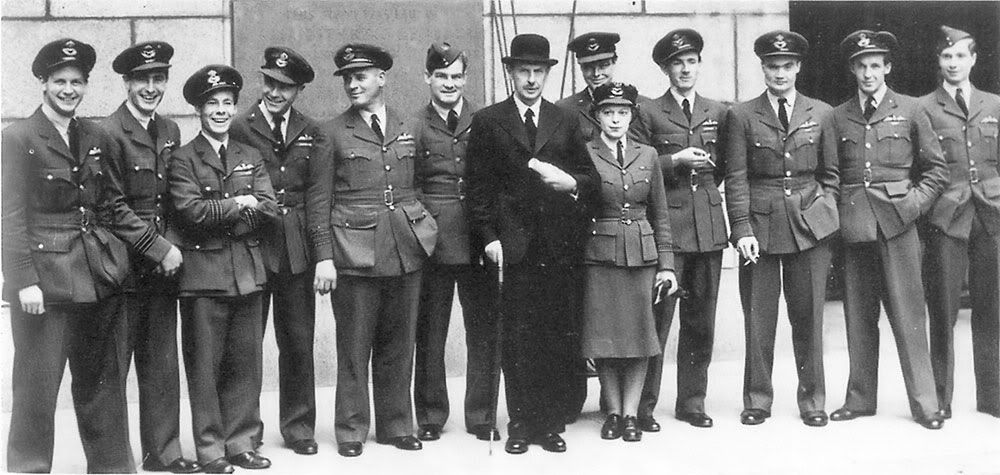 Photograph of Air Chief Marshal Sir Hugh Dowding and an aide with several Battle of Britain fighter pilots (representing "The Few") outside the Air Ministry in London during the celebration of the second anniversary of the RAF's most successful day of the Battle. Left to right as shown: Sqn Ldr A C Bartley DFC, Wg Cdr D F B Sheen DFC, Wg Cdr I R Gleed DSO DFC, Wg Cdr Max Aitken DSO DFC, Wg Cdr A G Malan DSO DFC, Sqn Ldr A C Deere DFC, Air Chief Marshal Sir Hugh Dowding, Flt Off E C Henderson, Flt Lt R H Hilary, Wg Cdr J A Kent DFC AFC, Wg Cdr C B F Kingcome, Sqn Ldr D H Watkins DFC and WO R H Gretton. This entry is the last in my book �Winged Words�. Fear not however, I have another book �We Speak from the Air� published in 1942, which contains 23 more BBC talks dating from the early war years. Will SoW BoB be out before this book finishes? RedToo.
Last edited by RedToo; 08/13/10 09:35 PM. Reason: Incorrect information.
My 'Waiting for Clod' thread: http://tinyurl.com/bqxc9eeAlways take sides. Neutrality helps the oppressor, never the victim. Silence encourages the tormentor, never the tormented.Elie Wiesel. Romanian born Jewish writer, professor, political activist, Nobel Laureate, Holocaust survivor. 1928 - 2016. Indeed the safest road to Hell is the gradual one - the gentle slope, soft underfoot, without sudden turnings, without milestones, without signposts. C.S. Lewis, 1898 - 1963.
|
|
#3077171 - 08/20/10 09:27 PM
 Re: While we're waiting for BoB SoW: WWII BBC RAF Broadcasts
[Re: RedToo]
Re: While we're waiting for BoB SoW: WWII BBC RAF Broadcasts
[Re: RedToo]
|
Joined: Nov 2005
Posts: 3,070
RedToo

Senior Member
|

Senior Member

Joined: Nov 2005
Posts: 3,070
Bolton UK
|
Part 75 � Part 1 of �We Speak from the Air� Aircraft Captures U-boat Hudson aircraft of coastal command recently sighted and attacked a u-boat in the Atlantic. As a result of this attack the u-boat was forced to the surface in a badly damaged condition and surrendered. (Admiralty and Air Ministry Communiqu�.) WE knew early in the morning that there was a U-boat somewhere round that part of the Atlantic. Another Hudson out on patrol from my squadron had seen her twice, but both times she dived and got away. The Atlantic didn't look very inviting when we left that morning. The sea was rough, and covered with angry white-caps. The clouds were low, and we kept on running into rain-storms and patches of dirty weather. We flew a good many miles close down to the sea�nothing to look at but clouds, and waves, and rain, and it was getting a bit monotonous. The first thing I knew about the U-boat was a shout from my second pilot, �There�s one just in front of you." He pointed out to the port bow, and there was a U-boat, roughly 1,200 yards away, just starting to crash-dive�they had seen us too. The second pilot was standing with his face pressed to the windscreen, and he had a better view than I had, so I called out to him, �Let me know when it's time to attack, Jack." He nodded, and a few seconds later my whole crew shouted, "Now!" When I came round again in a tight turn, the whole area of the sea was churned up into a foaming mass, and in the middle of it the U-boat suddenly popped to the surface again. So we dived straight on to her and opened up with all the guns we had. I had my front guns going, the wireless operator dropped on his tummy and wound down the belly gun in the floor of the aircraft, and the gunner in the turret was firing practically the whole time. We had tracer ammuni�tion loaded, and the red streaks of the tracer were flashing all round the conning-tower, and showering up the water all round the hull of the U-boat. To our surprise, just as we dived in again to the attack, the conning-tower hatch was flung open, and about a dozen men tumbled out, and slid down on to the deck. We thought at first they were making for their guns, so we kept our own guns going hard. The Germans who had already got out of the conning-tower didn't like that a bit, and they tried to scramble back again. The rest of the crew were still trying to get out of the hatch, and they sort of met in the middle and argued it out. It was a regular shambles for a few minutes. We could see them very clearly, for we were close on top of them, and they were wearing bright yellow life-saving jackets, rather like our Mae Wests. While the Germans were all stooging about in the conning-tower we continued to attack them, circling round each time and coming in again. That made the confusion below even worse. We went round four times, and we were just getting ready to dive on them for the fifth time when they decided they had had enough of it. They stuck a white rag of some sort out of the conning-tower, and waved it violently. We found out afterwards that it was a shirt they were using for a white flag. We all stopped firing, but continued to circle them with all our guns trained. The Germans were determined to make us understand that they had surrendered. They got hold of some sort of white board, and waved that at us too. We were still suspicious, so I dived right over the U-boat at about 50 feet, and then flew alongside her, to see what it was all about. They followed us all round with their white flag. We followed them all round with our guns trained on them. Practically the whole crew seemed to be in the conning-tower now, packed in so tightly they could hardly move. We were close enough to see their faces, and a glummer-looking lot I never saw in my life. Not a smile among them! It was only then that we began to realise that we really had captured a submarine, and they really had surrendered. The difficulty then was how to get them in. I even sug�gested jokingly that I should drop my second pilot by para�chute as prize crew, but he didn't fancy it. But we were determined to get them ashore if we could, submarine and all, so we sent off signals to our base, asking for surface craft to be sent to pick them up. We soon knew that several were on their way, steaming as hard as they could go, and other aircraft were being diverted to relieve us. All we had to do was to keep circling the U-boat with our guns trained, to prevent the crew going below; we had to intimidate the crew, and keep them in the conning-tower. We kept that up for three and a half hours, and it was a bit trying. I dared not take my eyes off them for a single second�and when we finished circling at last, I couldn't turn my head at all, my neck was so stiff. The wireless operator had even a worse job. He spent his three and a half hours signalling furiously. At last a relief aircraft turned up, a Coastal Command Catalina flying boat. We saw it coming, and we were scared it was going to attack the U-boat, so we flew towards it signalling hard that she had surrendered, and we were trying to take her prisoner. I think the actual signal we flashed was: " Look after our sub., it has shown the white flag." The Catalina boys understood, and they started to circle her too. Then another Hudson came up, and plenty more aircraft as the day wore on, but our petrol was getting a bit short, so we had to turn for home, and that was the last we saw of our U-boat. Of course the job wasn't anything like finished. We had had the incredible good luck to find the U-boat, but the Catalinas kept up the watch for hours, much longer than we did, through gales and darkness. They stuck on to the U-boat magnificently. Then the Navy came along, and they put up a grand show too, taking the U-boat in tow in the most difficult conditions, and bringing her right in to shore, with all the crew prisoners. And we owe the Navy a personal word of thanks, too, for a very nice gesture they made. They came down to our station and handed over to the squadron a rather wonderful memento of the occasion, a memento of which we shall always be very proud�the U-boat's flag. 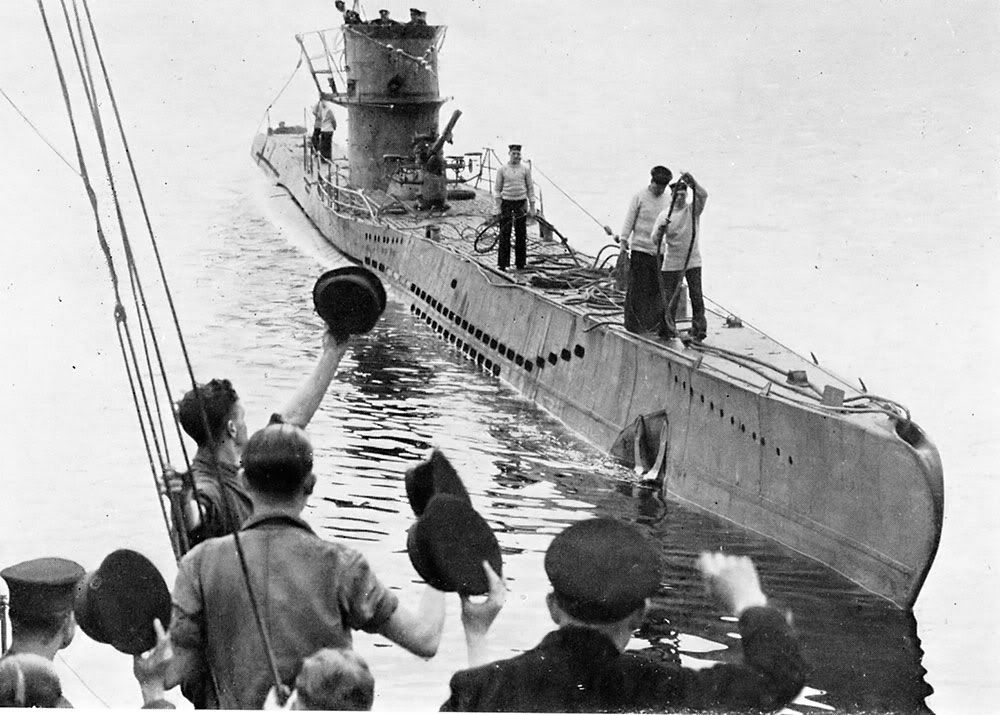 This photo is from �Coastal Command� - The Air Ministry Account of the Part Played by Coastal Command in the Battle of the Seas 1939 to 1942. Published in1942. Its caption is �A prize crew brings the U-boat into a British port� This U-boat is the one in the account above. The same story (but from an official viewpoint) being in the Coastal Command publication. The photo of a U-boat in part 57 of this thread is also of the same U-boat.
My 'Waiting for Clod' thread: http://tinyurl.com/bqxc9eeAlways take sides. Neutrality helps the oppressor, never the victim. Silence encourages the tormentor, never the tormented.Elie Wiesel. Romanian born Jewish writer, professor, political activist, Nobel Laureate, Holocaust survivor. 1928 - 2016. Indeed the safest road to Hell is the gradual one - the gentle slope, soft underfoot, without sudden turnings, without milestones, without signposts. C.S. Lewis, 1898 - 1963.
|
|
#3082381 - 08/28/10 09:06 PM
 Re: While we're waiting for BoB SoW: WWII BBC RAF Broadcasts
[Re: RedToo]
Re: While we're waiting for BoB SoW: WWII BBC RAF Broadcasts
[Re: RedToo]
|
Joined: Nov 2005
Posts: 3,070
RedToo

Senior Member
|

Senior Member

Joined: Nov 2005
Posts: 3,070
Bolton UK
|
Part 76. Apologies, late due to holidays 2. Mast-high Over Rotterdam A highly successful daylight raid was carried out this afternoon on enemy shipping in the docks at Rotterdam. Several squadrons of Blenheims of bomber command were engaged in the operation and the attack was pressed home with great daring from very low levels. (Air Ministry Communiqu�) THE first I saw of Rotterdam was a sky-line of high cranes over the docks. Climbing as high as the cranes themselves were fat columns of black smoke to mark the shipping that had already been successfully bombed. I was in the second formation of Blenheims to attack. I had watched the leading squadron cross the Dutch coast only a few feet above the sandy beaches, where people waved us on, and I wondered if they had noticed the R.A.F. unconsciously giving the �V " for Victory sign as we flew over in vic formation. There was the astonishing flatness that I had expected and only occasionally could I feel the aircraft lifted up to miss windmills, farmhouses and villages; but most of all I was delighted to see that the country Dutchmen really do wear baggy trousers and vivid blue shirts. Cows galloped nervously about as we came hedge-hopping over the fields. Nearly everyone we saw gave us some kind of cheery gesture: but one man, evidently alarmed, was crouching against a telegraph pole. Actually we were so low that a few of my friends brought back some evidence of it. One pilot, for instance, not only cut straight through a crane cable, but got a dent in the belly of his aircraft, and some red dust, scraped from a Dutch chimney-pot, stuck to his aircraft. The same pilot had evidently been corn-cutting in between the hedges and returned with a small sheaf of the stuff in a niche on the leading edge of his wing. We bombed Rotterdam at 4.55 in the afternoon. As we flashed across the docks, the observer saw �our " ship�a bulky black hull and one funnel. We nipped across the last building and from mast-height we let our load drop. She was a medium-sized ship�I should guess about 4,000 tons. I could feel the bomb doors springing to, and then we were away over towards the town. In ship bombing of this kind, often you can't see your results; but I had a very clear view of our own results this time. There was a terrific explosion and instantaneous smoke and flames. I have seen lots of these explosions by now, but this one was by far the biggest. Over to the left we saw a good many supply vessels burning from the attack by the first wave. Elsewhere burning warehouses obstructed the view and only the bombers following on could see what had happened. And then on our way out of the town, with white tracers whipping under us, I saw great pillars of smoke spring up from the other enemy ships we had bombed. We had a good trip home and it had been a great day. 9 Staffel/ Jagdeschwader 26 Pilots during the Battle of Britain: 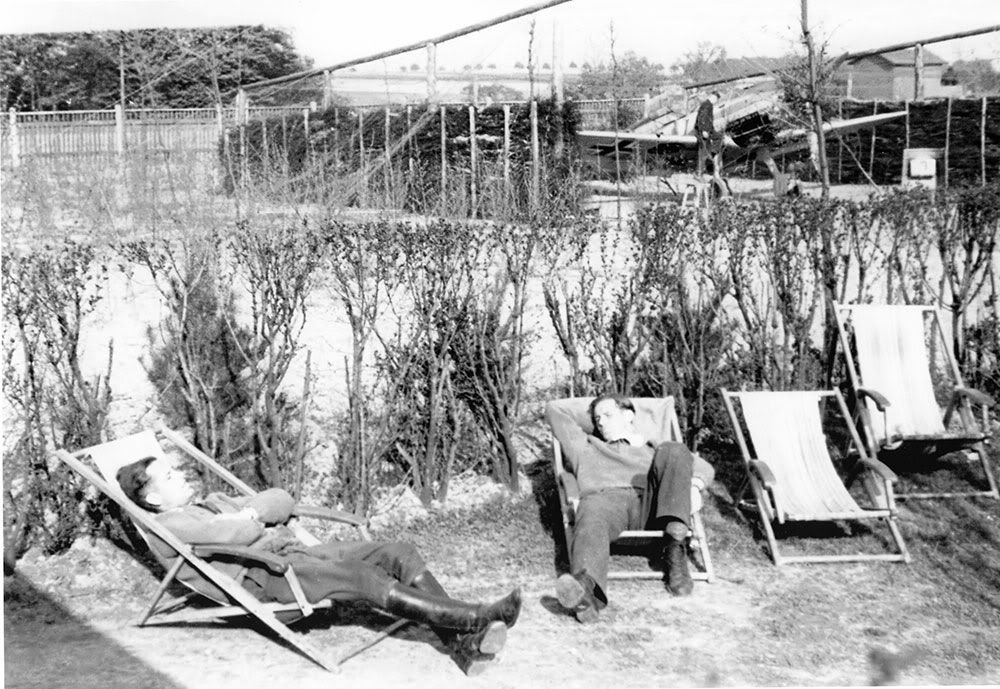 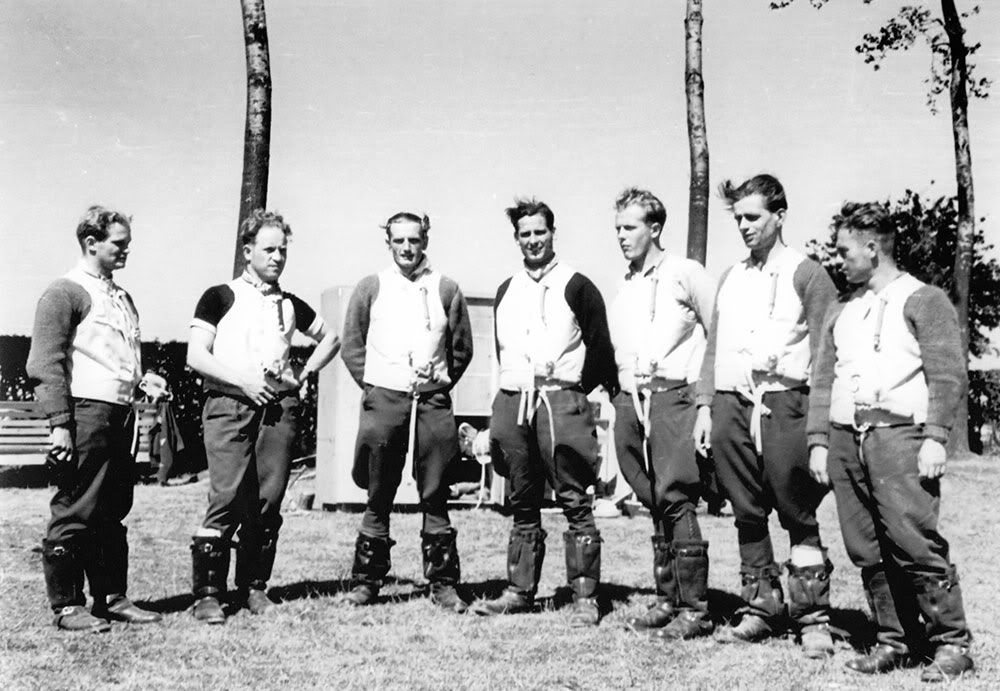
Last edited by RedToo; 08/28/10 09:12 PM.
My 'Waiting for Clod' thread: http://tinyurl.com/bqxc9eeAlways take sides. Neutrality helps the oppressor, never the victim. Silence encourages the tormentor, never the tormented.Elie Wiesel. Romanian born Jewish writer, professor, political activist, Nobel Laureate, Holocaust survivor. 1928 - 2016. Indeed the safest road to Hell is the gradual one - the gentle slope, soft underfoot, without sudden turnings, without milestones, without signposts. C.S. Lewis, 1898 - 1963.
|
|
#3086507 - 09/03/10 07:16 PM
 Re: While we're waiting for BoB SoW: WWII BBC RAF Broadcasts
[Re: RedToo]
Re: While we're waiting for BoB SoW: WWII BBC RAF Broadcasts
[Re: RedToo]
|
Joined: Nov 2005
Posts: 3,070
RedToo

Senior Member
|

Senior Member

Joined: Nov 2005
Posts: 3,070
Bolton UK
|
Part 77. 3. Fighter Pilot The king has been graciously pleased to approve the following awards, in recognition of gallantry displayed in flying operations against the enemy: Second bar to the Distinguished Flying Cross. Acting squadron leader�this officer has displayed a conspicuous gallantry and initiative in searching for and attacking enemy raiders, often in adverse weather conditions. Since December, 1940, he has destroyed three enemy bombers and one fighter, thus bringing his total victories to twenty-two. (Air Ministry Bulletin.) WHEN war broke out, I had been in the R.A.F. some four years and was delighted when I was posted as a flight com�mander to a new Spitfire squadron which had just been formed. We put in some pretty intensive training, and long before the spring of 1940 arrived we were right up to the mark and ready to go. Our first combat chanced to be with a large formation of Me. 109's, Nazi single-seater fighters. It took place over the coast of North Belgium, and the first thing I noticed after we had closed with them was that the air seemed to be full of planes milling around. I singled one out and was lucky enough to shoot him down in a wood near St. Omer. On that first meeting the squadron shot down eleven Huns for the loss of one of our pilots, who had crash-landed on the beach. That wood near St. Omer will be one of the first places I shall visit when we have won the war, because while out on our second patrol that same afternoon I shot down two Me. no's right alongside it. I had picked the first one out of a large party covering a bunch of Ju. 87's which were dive-bombing the harbour, and I forced him to crash-land alongside the wreckage of my morning Me. 109. Incidentally the pilot of that Me. no very nearly put an early end to my fighting career with nothing more than a pistol. I had circled him very low to make sure he had crashed, when he stepped out of the cockpit apparently unhurt and took a pot-shot at me with his pistol. It was either wizard shooting or the world's biggest fluke, for that shot went through my windscreen within an inch or two of my head. I turned quickly and dealt with him, and as I did so I saw that another no had been snooping along behind me over the tree-tops, hoping to pick me off. He opened up with cannon fire and put a shell through my fuselage, but I did a tight turn, squirted at him with what ammunition I had left, and he went down to crash alongside his two friends. As you can imagine, I was pretty bucked with that bag of three for my first day in action, and a couple of Dornier 17's the next day and another of the same type on the third day made me quite a lot happier. The second three were bagged over the Dunkirk-Calais-Boulogne area, and the last affair was a regular shooting match. I remember I arrived back at my base with no oil, no glycol, and the sliding hood and side door of my Spitfire shot away. I had a cannon shot through the tail which left only two inches play on the elevators with which to land, and I had no flaps, no brakes and a flat tyre. I did somehow manage to put it down all right, and as I finished my landing run the engine seized up. That Spitfire was too shot up and damaged to fly again, but I was lucky enough to escape with only a slight wound in the thigh, caused by a bit of metal flying off the rudder bar. I was fit again within a few days and, early on the morning of the first day I was back, nine of us came upon a bunch of Heinkel bombers with a high escort of about fifty Me. 109 fighters. I think pretty well all of us had picked off one of the Hun bombers each before down came the fighters. A few minutes later we had to try and make our way home because both petrol and ammunition were getting short. I was in a bit of a spot by then with six Me. 109's after me, but luckily I found a nice big friendly cloud in which I was able to turn and shoot down one of my pursuers into the sea with what ammunition I had left. Then I popped back into the cloud and arrived home with only five gallons of petrol left and five shell holes in my Spitfire. " All the boys home safely " was the entry in my log after that little affair. When the hectic Dunkirk days had ended, the squadron was sent into a quiet sector to rest and reorganise, and I remember a particularly enjoyable incident which happened one morning around the middle of August. Up at 15,000 feet over Cardiff I had picked up three Ju. 88's which were heading as if for Ireland. My stern attacks didn't seem to make the slightest impression on them, so I hared past them, turned and carried out head-on attacks. That worked all right, but by the time I had accounted for two of them the third had disappeared in the clouds. A few days later, when I was on my way to an aerodrome to get some of the holes in my Spitfire patched up, I struck the first of the big daylight blitzes on the South Coast, and ran into a couple of Ju. 88's off Beachy Head. I chased one of them about thirty-five miles out to sea before I shot him down. By that time we were right down on the water and as I turned and climbed the other Hun opened fire at me with his cannon. He shot my oil and glycol tanks away and part of my propeller, which caused excessive vibration. I climbed for all I was worth and pushed the engine flat out. Very soon it was on fire but, even so, it got me back sixty miles before it went up in smoke and I had to bale out. I was smothered in oil and couldn't see a tiling. Perhaps it was just as well, for if I'd realised I was only a few hundred feet up I'd probably never have had the nerve to jump. As it was, my 'chute opened with a bump a second or so before my feet hit the earth. Some Observer Corps men I spoke to later told me I was not more than 500 feet up when I jumped. I still go hot and cold when I think of that jump. Incidentally I gained an Iron Cross that evening. In the base hospital to which I was taken with an injured leg, I was put in a bed next to a German pilot who had been badly burned. He couldn't sleep and he could speak English perfectly�he told me he had spent his honeymoon in this country�I lay awake talking to him. He insisted on giving me his Iron Cross, which I always carry with me now as a mascot. It was after I had returned from this spell of sick leave that I had an experience which made me angrier than anything I can remember for a long time. I was shot down by a lone bomber�a most undignified experience for a fighter pilot. It was a Dornier and I ran into him as he was bombing shipping about fifteen miles off the south coast of Wales. I shot him down all right, but as he went seawards his rear gunner got in a burst which put two holes in my cylinders, and I just managed to scrape in on to the very edge of the cliffs near Tenby. I was knocked out in the crash, but fortunately not for long, and I leapt out of that cockpit pretty quickly when I heard the petrol sizzling on the hot engine! September 11th of last year is a day I shall always remember, for it was then I was promoted and given command of the Burma Squadron of Hurricanes. The first day I took them into action was a Sunday four days after my arrival. We found a big bunch of mixed bombers, flying in formations of anything from thirty to sixty, with escorting fighters above them. As I led my new squadron in, I saw three of these parties nearing London. As the boys waded into the bombers, I went for some of the fighters. I picked off an Me. no which I shot down over Barking, and one of his pals nearly got his own back when he put a bullet through my windscreen a few inches from my head. The squadron had a bag of five in that first outing, and there was quite a party in the Mess that night. It was soon after this show that I had one of the luckiest breaks on record. I had been ordered up in rather bad cloud and hadn't been in the air ten minutes when I was told by radio that an enemy aircraft was near me. I hadn't finished acknowledging the information when I came out of the cloud, and there, dead in my sights and not 100 yards away, a Ju. 88 was waffling contentedly along. I yelled into my telephone, �Good heavens, he's here," pressed my gun-button as I spoke, and the raider crashed near Southwold. The above BBC talk was by Robert Stanford Tuck. Here is his Wikipedia page: http://en.wikipedia.org/wiki/Robert_Stanford_Tuck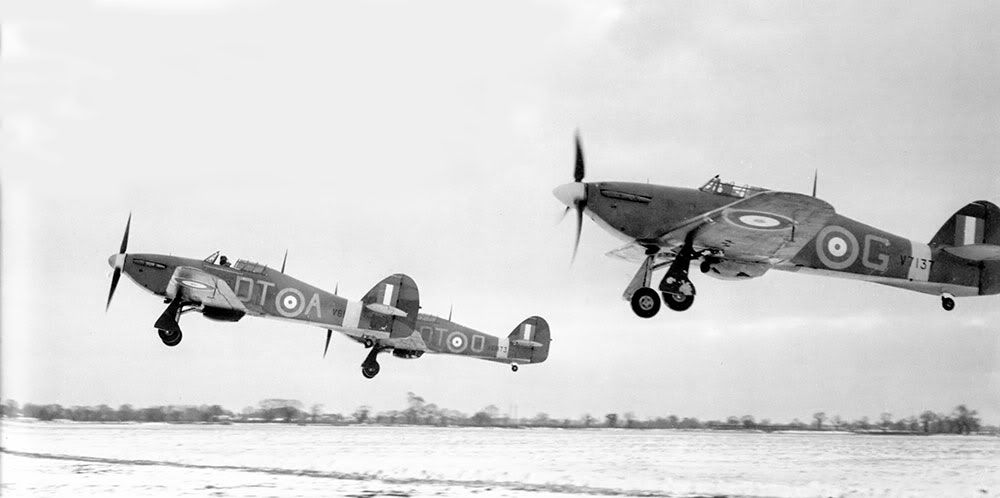 A section of three Hurricane Mk 1s of 257 Burma Squadron take off from snow-bound Colishall, Norfolk. Led by Squadron Leader R.R. Stanford Tuck, in V6864 DT-A. Note pilot size 
Last edited by RedToo; 09/03/10 07:18 PM.
My 'Waiting for Clod' thread: http://tinyurl.com/bqxc9eeAlways take sides. Neutrality helps the oppressor, never the victim. Silence encourages the tormentor, never the tormented.Elie Wiesel. Romanian born Jewish writer, professor, political activist, Nobel Laureate, Holocaust survivor. 1928 - 2016. Indeed the safest road to Hell is the gradual one - the gentle slope, soft underfoot, without sudden turnings, without milestones, without signposts. C.S. Lewis, 1898 - 1963.
|
|
|
|